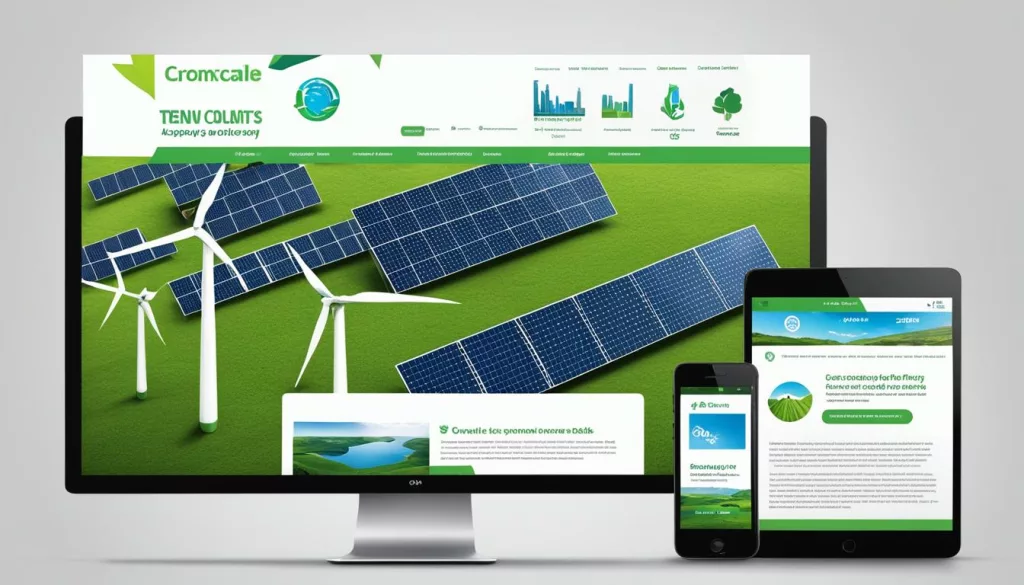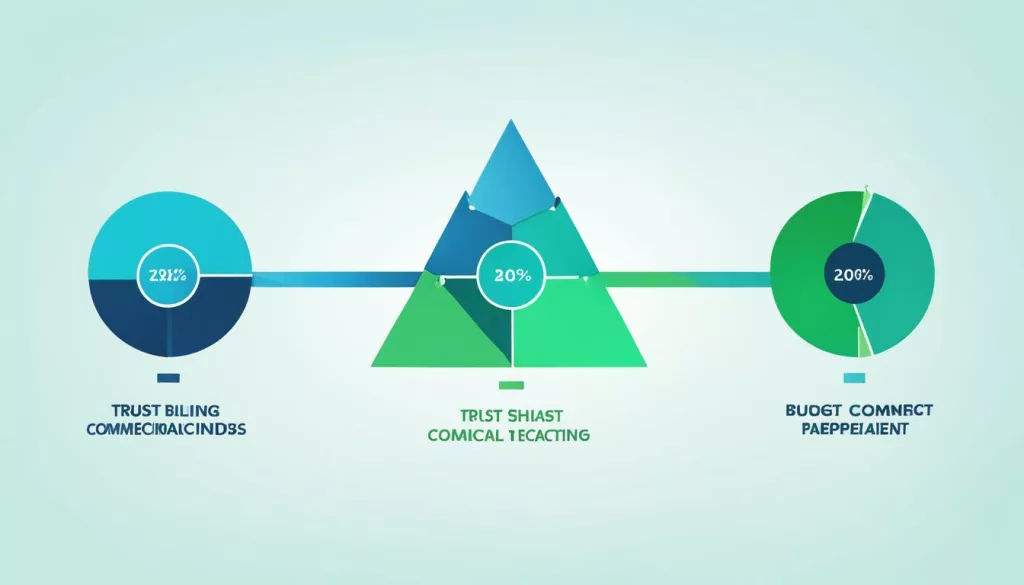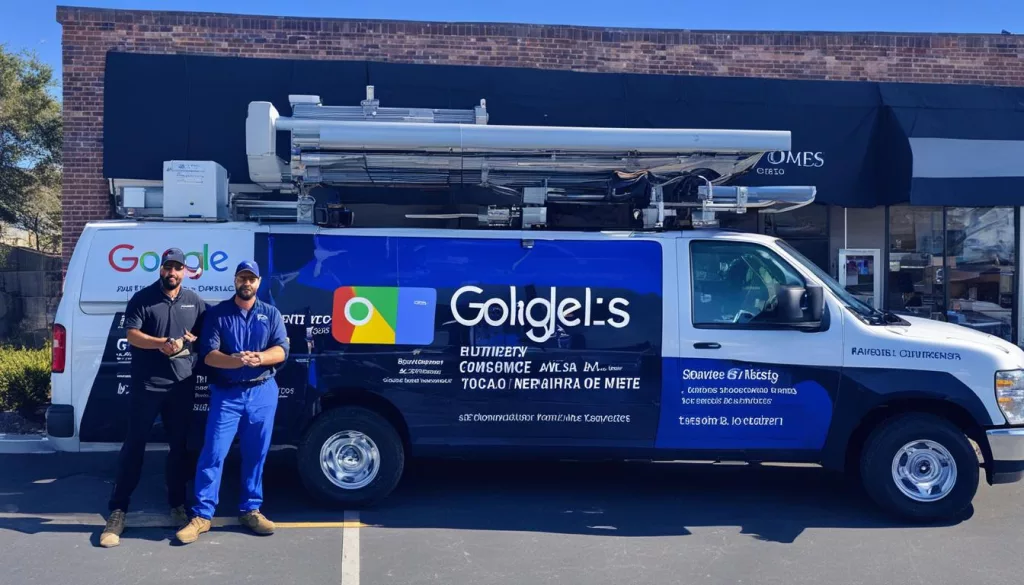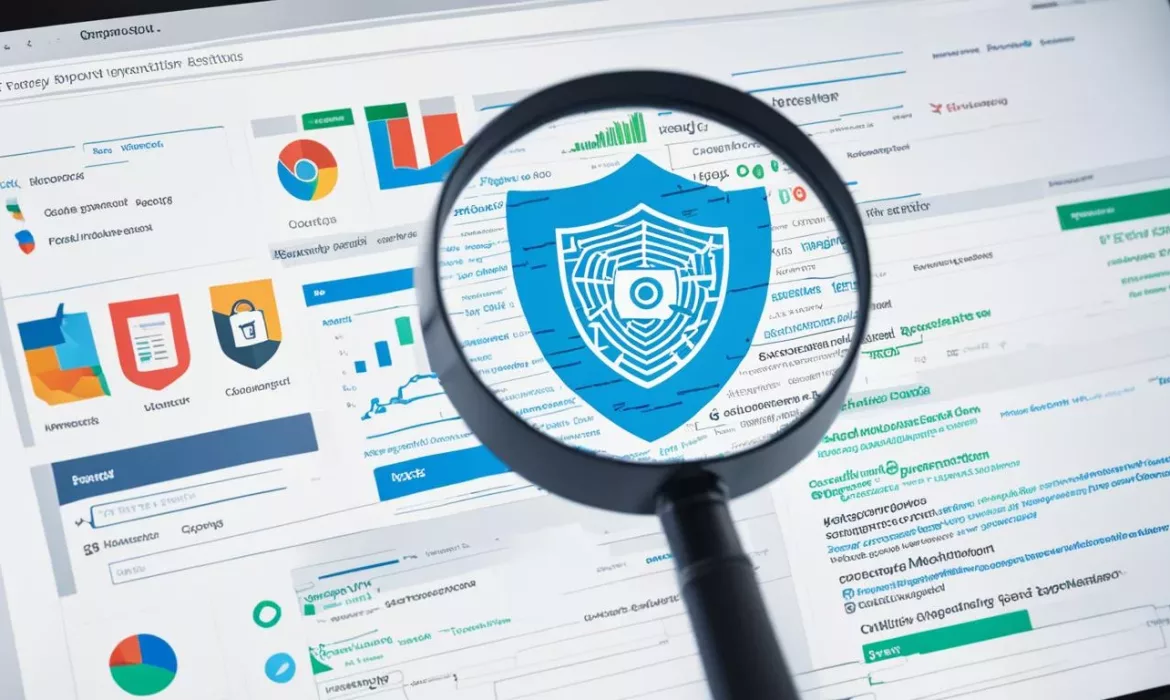Digital Marketing for Sustainable Energy Solution Providers
The global renewable power capacity is expected to grow by 50% between 2019 and 2024, and the worldwide renewable energy market is forecasted to expand to $1 billion by 2025. In this rapidly evolving industry, it is crucial for sustainable energy solution providers to leverage digital marketing strategies to effectively promote their brand, reach their target audience, and contribute to the global transition towards clean energy.
Key Takeaways:
- Digital marketing is a valuable tool for renewable energy companies to connect with their target audience.
- Internet marketing offers an impressive ROI and allows for precise targeting and measurement of results.
- Online marketing strategies include SEO, PPC advertising, social media marketing, email marketing, and web design.
- A strong online presence is crucial for attracting visitors, improving search engine visibility, and establishing credibility.
- Engaging with the audience through social media and hosting webinars can foster closer relationships and showcase expertise.
Five Reasons to Use Digital Marketing for Renewable Energy Companies
In today’s digital age, internet marketing has become a powerful tool for renewable energy companies to connect with their target audience and drive business growth. Here are five key reasons why renewable energy companies should embrace digital marketing:
- Reach potential customers: The popularity of the internet enables renewable energy companies to reach a wide range of potential customers who actively research companies and solutions online. By establishing a strong online presence, companies can increase brand visibility and attract potential customers interested in sustainable energy solutions.
- Impressive ROI: Internet marketing offers a high return on investment (ROI) for renewable energy companies. Strategies such as pay-per-click (PPC) advertising, email marketing, and influencer marketing have consistently shown impressive returns, helping companies generate leads, drive conversions, and increase revenue.
- Precise targeting: Online marketing allows for precise targeting, ensuring that renewable energy companies can effectively reach their desired audience. Search engine optimization (SEO) techniques and social media ads enable companies to tailor their messages and target specific demographics or interests, maximizing engagement and conversion rates.
- Measure and analyze results: Digital marketing provides extensive data and analytics that allow renewable energy companies to measure the effectiveness of their campaigns. Companies can track website visitors, ad clicks, and keyword rankings, gaining valuable insights into customer behavior and campaign performance. This data-driven approach helps optimize marketing strategies for even better results.
- Adaptability: One of the greatest advantages of digital marketing is its adaptability. Companies can easily make changes to their campaigns based on performance metrics and audience feedback. This flexibility allows renewable energy companies to refine their messaging, target new markets, and stay ahead of the competition in an ever-evolving digital landscape.
| Reasons to Use Digital Marketing for Renewable Energy Companies | Benefits |
|---|---|
| Reach potential customers | Increased brand visibility and customer engagement |
| Impressive ROI | Generate leads, drive conversions, and increase revenue |
| Precise targeting | Maximize engagement and conversion rates |
| Measure and analyze results | Optimize marketing strategies for better results |
| Adaptability | Refine messaging, target new markets, and stay ahead of the competition |
Online Marketing Strategies for Renewable Energy Companies
Renewable energy companies can benefit greatly from implementing various online marketing strategies. By utilizing these strategies, they can enhance their online presence, reach a wider audience, and drive growth for their business. Let’s explore some key online marketing strategies that can be deployed by renewable energy companies:
1. Search Engine Optimization (SEO)
SEO plays a crucial role in improving the search engine visibility of renewable energy companies. By optimizing their website with relevant keywords, creating high-quality content, and building authoritative backlinks, these companies can improve their organic ranking on search engine results pages. This results in increased website traffic and better brand exposure to potential customers actively searching for renewable energy solutions.
2. Pay-Per-Click (PPC) Advertising
PPC advertising allows renewable energy companies to target specific keywords and audiences through platforms like Google Ads. By bidding on relevant keywords, these companies can display their ads prominently on search engine results pages. PPC advertising provides immediate visibility and can be highly effective in generating leads and driving conversions. It ensures that businesses are visible to potential customers at the right time.
3. Social Media Marketing
Social media platforms offer renewable energy companies a powerful way to build brand awareness, engage with their target audience, and foster customer relationships. By creating compelling content and leveraging social media advertising, these companies can reach a larger audience, enhance their brand reputation, and drive website traffic. Engaging with followers, responding to comments, and sharing informative content creates a sense of community and can lead to increased customer loyalty.
4. Email Marketing
Email marketing is a highly effective strategy for renewable energy companies to nurture leads, retain customers, and deepen customer relationships. By building an email list and sending targeted and personalized messages, companies can provide valuable content, showcase new products or services, and communicate directly with their audience. Email marketing allows companies to stay top-of-mind with customers, nurture leads through the sales funnel, and drive repeat business.
5. Web Design and Development
A professional and user-friendly website is crucial for renewable energy companies to make a strong impression on potential customers. Investing in web design and development ensures a visually appealing and intuitive website that effectively communicates the company’s brand, values, and offerings. A well-designed website enhances user experience, encourages longer visitor engagement, and increases the chances of conversions.
Implementing these online marketing strategies can significantly benefit renewable energy companies by improving their online visibility, increasing brand awareness, driving targeted traffic, and boosting lead generation. Combining multiple strategies and continuously monitoring and optimizing their performance will help these companies stay ahead of the competition and drive sustainable growth.

| Online Marketing Strategy | Benefits |
|---|---|
| Search Engine Optimization (SEO) |
|
| Pay-Per-Click (PPC) Advertising |
|
| Social Media Marketing |
|
| Email Marketing |
|
| Web Design and Development |
|
The Importance of Building a Strong Online Presence for Renewable Energy Companies
Having a robust online presence is essential for renewable energy companies. In today’s digital age, an online presence allows companies to connect with a wider audience, establish credibility, and promote their brand effectively.
A visually appealing and informative website is the foundation of a strong online presence. By optimizing the website for search engines (SEO), renewable energy companies can attract more visitors and increase their search engine visibility. This optimization involves implementing relevant keywords, meta tags, and creating high-quality content that resonates with their target audience.
Search engine optimization (SEO) plays a crucial role in improving a company’s visibility on search engines like Google. By implementing SEO strategies, such as optimizing website content, building quality backlinks, and improving website speed and user experience, renewable energy companies can improve their search engine rankings and drive organic traffic to their website.
A strong online presence also allows renewable energy companies to showcase their brand, products or services, successes, and values. This serves as a platform for companies to differentiate themselves from their competitors and establish trust with their target audience. By effectively communicating their unique selling points and sharing relevant content, companies can engage their visitors and demonstrate their expertise in the renewable energy industry.
“A strong online presence allows renewable energy companies to establish themselves as industry leaders, gain the trust of potential customers, and drive business growth.” – John Smith, Digital Marketing Expert
A well-established online presence can also lead to valuable partnerships and collaborations with other industry players and stakeholders. By showcasing their expertise and values, renewable energy companies can attract potential investors, suppliers, and strategic partners.
In conclusion, building a strong online presence is crucial for renewable energy companies to succeed in today’s digital landscape. An optimized website, effective SEO strategies, and a compelling brand message can attract visitors, improve search engine visibility, and establish trust and credibility. By investing in their online presence, renewable energy companies can pave the way for sustainable growth and contribute to a cleaner, greener future.
Engaging with Your Audience through Digital Marketing
Digital marketing offers renewable energy companies numerous opportunities to directly engage with their audience, fostering meaningful connections and building stronger relationships. By leveraging the power of social media engagement, hosting webinars and virtual events, and creating vibrant online communities, renewable energy companies can effectively connect with their target market and drive customer loyalty.
- Social Media Engagement: Engaging with customers through social media platforms is a powerful way for renewable energy companies to interact with their audience on a personal level. By responding to comments and queries, addressing feedback, and actively participating in conversations, companies can establish themselves as knowledgeable and responsive industry leaders.
- Webinars and Virtual Events: Hosting webinars and virtual events centered around renewable energy topics allows companies to demonstrate their expertise, share valuable insights, and engage directly with prospects and customers. These interactive sessions provide an ideal platform to answer questions, highlight innovative solutions, and showcase thought leadership within the industry.
- Online Community Building: Creating an active and vibrant online community provides a space for customers to connect, share experiences, and provide support to one another. This fosters customer advocacy and loyalty, while also allowing companies to gather valuable feedback and gain insights into their target audience’s needs and preferences.
Engaging with your audience through digital marketing channels not only strengthens the bond between your renewable energy company and its customers but also helps to humanize your brand and establish trust. By actively participating in online conversations and providing valuable resources, you can become a go-to source for industry-related information, building a loyal following that advocates for your brand.
Engaging with your audience through digital marketing channels not only strengthens the bond between your renewable energy company and its customers but also helps to humanize your brand and establish trust. By actively participating in online conversations and providing valuable resources, you can become a go-to source for industry-related information, building a loyal following that advocates for your brand.
Benefits of Engaging with Your Audience:
| Benefits | Description |
|---|---|
| Enhanced Brand Visibility | Engaging with your audience on social media platforms increases your brand’s visibility and reach, allowing you to connect with a broader audience. |
| Improved Customer Satisfaction | Addressing comments, queries, and feedback promptly and professionally demonstrates your commitment to customer satisfaction, enhancing their overall experience. |
| Increased Trust and Credibility | Directly engaging with your audience fosters trust and credibility, positioning your brand as an authoritative source and industry leader. |
| Valuable Customer Insights | Engagement provides an opportunity to gather valuable insights into your audience’s preferences, needs, and pain points, enabling you to tailor your marketing efforts accordingly. |
| Customer Advocacy and Loyalty | An engaged online community drives customer advocacy and loyalty, with satisfied customers becoming ambassadors for your brand. |
Leveraging Compelling Content for Renewable Energy Marketing
Creating and sharing compelling content is a crucial aspect of renewable energy marketing. By showcasing real-world projects, before-and-after shots, testimonials, and data, companies can effectively demonstrate the capabilities and benefits of renewable energy solutions. This visually engaging approach helps potential customers envision the positive impact of embracing sustainable energy.
Informing and educating the audience about the advantages of renewable energy is also key. By providing informative content that addresses common questions and concerns, companies can foster trust and encourage conversions. Clear and concise explanations of sustainable energy benefits allow consumers to make more informed decisions.
Case Studies: Real-world Success Stories
“Our solar energy solutions have transformed the way businesses operate. Through a case study of Company X, we highlight how our innovative solar panel installation reduced their energy costs by 30% and helped them achieve their sustainability goals.” – Green Energy Solutions
Case studies serve as powerful marketing tools. By presenting in-depth analyses of specific projects, companies can showcase the tangible benefits of renewable energy solutions. These success stories not only improve brand credibility but also provide potential customers with the confidence to invest in sustainable energy.
Sharing Sustainability Reports
“Our commitment to sustainability is reflected in our latest report, where we detail how our wind turbines have helped reduce CO2 emissions by 50% in County A and provided clean energy to thousands of households.” – Wind Power Solutions
Sustainability reports provide a transparent account of a company’s environmental impact, making it an essential part of renewable energy marketing. By sharing data and statistics that demonstrate the positive effects of sustainable energy solutions, companies can attract environmentally conscious customers and reinforce their commitment to sustainable practices.
Informative Infographics
Visual content such as infographics can effectively communicate complex information in a digestible format. By condensing key data and outlining the environmental and economic benefits of renewable energy, infographics provide an engaging way to educate and persuade potential customers.
| Advantage | Impact on Customers |
|---|---|
| Cost Savings | Lower energy bills, increased financial stability |
| Eco-Friendliness | Reduced carbon footprint, contribution to a sustainable future |
| Energy Independence | Less reliance on traditional energy sources, greater control |
Ultimately, compelling content plays a vital role in renewable energy marketing. By effectively communicating the benefits of sustainable energy, sharing success stories, and providing informative resources, companies can captivate their audience and inspire them to embrace renewable energy solutions.
Paid Advertising and PPC Campaigns for Renewable Energy Companies
Paid online advertising, such as PPC campaigns, offers significant advantages to renewable energy companies looking to boost their visibility and drive targeted traffic to their websites. By leveraging platforms like Google Ads and social media, these companies can precisely target relevant keywords and specific audiences, maximizing the impact of their advertising efforts.
Renewable energy companies can utilize paid advertising to effectively reach potential customers who are actively searching for sustainable energy solutions. Through well-crafted PPC campaigns, these companies can appear prominently in search engine results, increasing their chances of attracting qualified leads and driving conversions.
By monitoring the performance of their paid advertising campaigns, renewable energy companies can gain valuable insights into the effectiveness of their strategies. Adjustments can be made based on ROI metrics, ensuring that ad spend is optimized and generating the highest possible returns.
Advertising on Google Ads enables renewable energy companies to display targeted ads to users who are actively searching for keywords related to their products or services. The ability to control ad placements, budgets, and targeting parameters allows for precise and strategic campaign management.
Social media advertising provides renewable energy companies with another powerful avenue for paid promotion. Platforms like Facebook, Instagram, and LinkedIn offer advanced targeting options based on demographics, interests, and behaviors. By tailoring ads to specific audiences, renewable energy companies can effectively engage with potential customers who are likely to be interested in their offerings.

Overall, paid advertising and PPC campaigns are essential tools for renewable energy companies seeking to maximize their online visibility and reach the right audience. By using platforms like Google Ads and social media advertising, these companies can drive targeted traffic to their websites, generate leads, and ultimately contribute to a more sustainable future.
Conclusion
Digital marketing is an indispensable tool for renewable energy companies seeking to promote their brand, connect with audiences, and drive growth. By embracing online strategies, these companies can effectively navigate the competitive landscape and contribute to the global transition towards clean energy.
Understanding the unique challenges and opportunities in the renewable energy industry, companies can tailor their digital marketing efforts to target specific audiences and build a strong online presence. Engaging with customers through social media platforms, webinars, and virtual events allows for direct interaction and relationship-building.
To maximize the impact of digital marketing, renewable energy companies must leverage compelling content that showcases real-world projects, highlights sustainable energy benefits, and educates the audience. By providing informative content and sharing success stories through case studies, these companies can establish trust and credibility, driving conversions and brand loyalty.
As digital marketing continues to evolve, staying updated with future trends is crucial. Technologies like artificial intelligence, augmented reality, and voice search will shape the digital marketing landscape. By embracing these innovations and adapting online strategies, renewable energy companies can stay ahead of the curve and make a significant impact in the industry.
FAQ
What is the importance of digital marketing for sustainable energy solution providers?
Digital marketing is crucial for sustainable energy solution providers as it allows them to reach potential customers who research companies online and target specific audiences. It offers an impressive return on investment (ROI) and allows for the measurement and adjustment of campaigns based on performance metrics.
What online marketing strategies can renewable energy companies utilize?
Renewable energy companies can utilize a range of online marketing strategies, including search engine optimization (SEO) to improve search engine visibility, pay-per-click (PPC) advertising to target specific keywords and audiences, social media marketing to build brand awareness and engage with customers, email marketing to nurture leads and retain customers, and web design and development to create a user-friendly and professional website.
How important is building a strong online presence for renewable energy companies?
Building a strong online presence is essential for renewable energy companies as it enables them to attract visitors, increase visibility, and establish trust and credibility. An optimized website and effective SEO strategies can help improve search engine rankings and drive organic traffic.
How can renewable energy companies engage with their audience through digital marketing?
Renewable energy companies can engage with their audience through social media platforms by responding to comments and queries and addressing feedback. Hosting webinars and virtual events on renewable energy topics allows for direct interaction with prospects and customers. Creating an online community fosters customer interaction, advocacy, and loyalty.
What role does compelling content play in renewable energy marketing?
Compelling content is crucial for renewable energy marketing as it showcases real-world projects, testimonials, and data, demonstrating the benefits of renewable energy solutions. Educating the audience about the advantages of renewable energy and providing informative content can encourage conversions and improve brand credibility.
How can paid advertising and PPC campaigns benefit renewable energy companies?
Paid online advertising, such as PPC campaigns, can significantly boost visibility and drive targeted traffic to the websites of renewable energy companies. Advertising through platforms like Google Ads and social media allows for precise targeting of keywords and specific audiences, maximizing the effectiveness of paid advertising campaigns.
Why is digital marketing essential for promoting renewable energy companies?
Digital marketing plays a crucial role in promoting renewable energy companies by connecting with audiences and driving growth. By understanding the competitive landscape, identifying target audiences, building a strong online presence, engaging with customers, leveraging compelling content, utilizing paid advertising, and monitoring data, renewable energy companies can effectively promote their brand and contribute to the global transition towards clean energy.
How can renewable energy companies stay ahead by keeping up with future trends in digital marketing?
Staying updated with future trends in digital marketing is essential for renewable energy companies to maximize the impact of online strategies. As the industry evolves, embracing new technologies, platforms, and marketing techniques will allow companies to stay ahead of the competition and effectively reach their target audience.
9 Effective Content Strategies for Botox and Dermal Filler Specialists
Botox and dermal filler specialists have a unique opportunity to connect with their targeted audience through effective content marketing strategies. By employing these strategies, specialists can not only attract new clients but also build trust and establish their credibility in the industry. In this article, we will explore nine proven content strategies that will help Botox and dermal filler specialists enhance their digital marketing efforts and maximize their reach.
Digital marketing plays a crucial role in today’s competitive landscape. Utilizing various techniques and platforms can significantly impact a specialist’s success in reaching their target market. Let’s dive into some key strategies that can elevate their content marketing game.
Key Takeaways:
- Knowing your target market is essential for creating targeted marketing messages and campaigns.
- Building trust through highlighting experience and providing comprehensive pre and post-treatment instructions can attract and retain clients.
- Leveraging social media platforms can help increase brand visibility and engagement with potential clients.
- Investing in search engine optimization (SEO) can improve website visibility and drive organic traffic.
- Partnering with other local businesses can expand your reach and attract new clients.
These content marketing strategies, when implemented effectively, can make a significant impact on a Botox and dermal filler specialist’s marketing efforts. By understanding their target audience, building trust, utilizing social media, and optimizing their online presence, specialists can enhance their digital marketing strategy and stand out from the competition.
Know Your Target Market
Creating a successful Botox marketing campaign requires specialists to have a deep understanding of their target market. While Botox injections have traditionally been popular among women aged 35 to 50 years old, there is a growing trend of younger individuals seeking preventative treatments.
By identifying their target market, specialists can customize their marketing messages and tactics to effectively reach and resonate with their audience. This allows them to craft compelling marketing campaigns that address the specific needs and desires of their target market.
Understanding the Target Market
When targeting a specific audience, specialists should consider various factors such as age, gender, lifestyle, and motivations. Conducting thorough market research and analyzing customer data can provide valuable insights into the preferences and behaviors of their target market.
Understanding the target market is the foundation of any successful marketing strategy. By knowing their audience, Botox and dermal filler specialists can tailor their marketing messages and speak directly to the needs and desires of their potential clients.
Customizing Marketing Messages
Once specialists have a clear picture of their target market, they can create marketing messages that resonate with their audience. This involves highlighting the benefits and results of Botox treatments, addressing common concerns or misconceptions, and showcasing before and after images to demonstrate the effectiveness of their services.
Furthermore, specialists can utilize testimonials and success stories from satisfied clients to build trust and credibility. This social proof can be particularly influential in convincing potential clients to choose their services.
Choosing Effective Marketing Channels
To effectively reach their target market, specialists must identify the most appropriate marketing channels. This may include digital platforms such as social media, search engine advertising, and email marketing. Additionally, offline channels like local events, print advertising, and partnerships with other businesses can also be valuable strategies.
By carefully selecting the marketing channels that are most likely to reach their target market, specialists can maximize the impact of their campaigns and optimize their return on investment.
| Benefits of Knowing Your Target Market | Outcomes |
|---|---|
| 1. Tailor marketing messages to resonate with the target audience | Higher engagement and conversion rates |
| 2. Choose appropriate marketing channels that reach the target market | Increased visibility and brand awareness |
| 3. Maximize ROI by focusing resources on the most receptive audience | Cost-effective marketing campaigns |

Focus on Building Trust
Building trust is a crucial aspect of any successful marketing campaign in the aesthetic industry. For Botox and dermal filler specialists, establishing trust is key to ensuring client satisfaction and repeat business. Clients need to feel comfortable and confident in the services provided by specialists.
To build trust, specialists should highlight their experience and qualifications, emphasizing their expertise in delivering safe and effective treatments. Providing detailed pre and post-treatment instructions shows a commitment to client care and safety.
Follow-up communication with clients is also important in building trust. By reaching out after treatments, specialists can address any concerns, ensure client satisfaction, and demonstrate their commitment to individualized care.
Building trust with clients is a continuous process that requires clear communication, expertise, and a focus on exceptional client experiences.
By prioritizing trust-building strategies, such as emphasizing qualifications and experience, providing thorough instructions, and maintaining open lines of communication, Botox and dermal filler specialists can establish credibility and client satisfaction.
Leverage Social Media
Social media marketing is an essential strategy for Botox and dermal filler specialists to reach a larger audience and increase their brand visibility. By leveraging the power of platforms such as Facebook, Instagram, and Twitter, specialists can effectively engage with potential clients and showcase their expertise.
One key aspect of social media marketing is creating engaging content that captures the attention of your audience. This can include educational posts about the benefits of Botox and dermal fillers, beauty tips, and behind-the-scenes glimpses into your practice. Use visually appealing images and videos to enhance your content and make it more shareable and relatable.

Client Testimonials: Highlighting Success Stories
One powerful way to make your social media content more compelling is by sharing client testimonials. These testimonials help build trust and credibility, showing potential clients the positive experiences others have had with your services.
“After receiving Botox injections from Dr. Smith, I couldn’t be happier with the results. My wrinkles have diminished, and I feel more confident than ever before. Highly recommend!” – Sarah Johnson
When sharing client testimonials, be sure to include their full name and a photo (with their permission) to add authenticity and credibility to the testimonial.
Collaborations with Influencers
Another effective way to leverage social media is by collaborating with influencers in the beauty industry. Influencers have a dedicated following and can help promote your services to their engaged audience. Look for influencers whose values align with your brand and reach out to them for collaborations, such as sponsored posts or giveaways.
When collaborating with influencers, it’s important to establish clear guidelines and expectations to ensure that the content they create aligns with your brand identity and messaging. This can help you reach new audiences and increase your social media following.
Engagement and Interactivity
Engagement is key to social media marketing success. Respond promptly to comments, direct messages, and inquiries from followers. Encourage your audience to engage with your content by asking questions, running contests, or hosting live Q&A sessions. This increases the likelihood of your content being shared and reach being extended to a wider audience.
Remember to use relevant hashtags in your posts to increase your visibility and reach on social media. Research popular and trending hashtags in the beauty and aesthetics industry to ensure that your content reaches the right audience.
| Platform | Avg. Monthly Active Users |
|---|---|
| 2.8 billion | |
| 1 billion | |
| 330 million |
With billions of monthly active users on platforms like Facebook, Instagram, and Twitter, social media marketing provides an incredible opportunity for Botox and dermal filler specialists to connect with potential clients and grow their business. By consistently creating engaging content, sharing client testimonials, collaborating with influencers, and staying active and responsive, specialists can maximize the impact of their social media marketing efforts.
Invest in Search Engine Optimization (SEO)
In today’s digital age, website optimization is crucial for Botox and dermal filler specialists looking to increase their online visibility and attract more clients. By investing in search engine optimization (SEO), specialists can improve their website’s chances of ranking higher in search engine results and drive organic traffic.
One of the key aspects of SEO is optimizing website content. By strategically incorporating relevant keywords throughout their website, specialists can signal to search engines that their website is highly relevant to users searching for Botox and dermal filler services.
In addition to optimizing website content, specialists should pay attention to meta descriptions and titles. Meta descriptions provide a brief summary of the page’s content in search engine results, while titles serve as the clickable headline. By crafting compelling meta descriptions and titles with relevant keywords, specialists can entice users to click through to their website.
Another important component of SEO is claiming and optimizing the Google My Business listing. This free tool allows specialists to showcase their business information, including location, contact details, and services offered. Optimizing the Google My Business listing can help specialists appear in local search results and increase their online presence.
FAQ
What are some effective content strategies for Botox and dermal filler specialists?
Botox and dermal filler specialists can employ several content marketing strategies to attract and engage their targeted audience. These strategies include knowing their target market, focusing on building trust, offering special promotions, leveraging social media, utilizing Google My Business, implementing email marketing, hosting events, partnering with other local businesses, investing in SEO, and focusing on client experience.
How can Botox and dermal filler specialists identify their target market?
Botox and dermal filler specialists can identify their target market by understanding the demographics and preferences of their ideal clients. By knowing their target market, specialists can tailor their marketing messages and tactics to better resonate with their audience.
Why is building trust important for Botox and dermal filler specialists?
Building trust is essential for any successful marketing campaign in the aesthetic industry. Clients need to feel comfortable and confident in the services provided by Botox and dermal filler specialists. To establish trust, specialists should highlight their experience and qualifications, provide detailed pre and post-treatment instructions, and follow up with clients to ensure their satisfaction.
How can Botox and dermal filler specialists leverage social media?
Botox and dermal filler specialists can leverage social media by creating engaging content, sharing client testimonials and before/after photos, and using relevant hashtags to increase their reach. Collaborating with influencers in the beauty industry can also boost brand visibility.
How can Botox and dermal filler specialists improve their website’s visibility?
Botox and dermal filler specialists can improve their website’s visibility by investing in search engine optimization (SEO). This involves optimizing website content, meta descriptions, and titles to ensure they rank for relevant keywords. Claiming and optimizing their Google My Business listing is also crucial for increasing online presence.
SEO for Penetration Testing Service Providers
Cybersecurity awareness is growing rapidly, and businesses are increasingly turning to search engines to find reliable penetration testing service providers. In such a competitive market, it is crucial for these providers to optimize their online presence through effective search engine optimization (SEO) strategies. By harnessing the power of SEO, penetration testing service providers can enhance their online visibility, attract more leads, and gain the trust of potential clients.
Key Takeaways:
- SEO is essential for penetration testing service providers to improve their online visibility.
- Effective SEO strategies can help attract qualified leads and increase trust from potential clients.
- Keyword research, on-page optimization, link building, and content marketing are key elements of SEO for penetration testing service providers.
- Implementing SEO strategies can significantly impact lead generation, conversion rates, and ROI.
- Choosing the right SEO strategy tailored to the provider’s goals and target audience is crucial for success.
The Importance of SEO for Penetration Testing Service Providers
SEO, or search engine optimization, plays a crucial role in elevating the online visibility of penetration testing service providers. In today’s digital era, businesses and individuals heavily rely on search engines to find reliable cybersecurity partners. By implementing tailored SEO strategies, penetration testing companies can improve their search engine rankings, drive organic traffic to their websites, and attract potential clients.
When potential clients search for penetration testing services, they are more likely to trust and engage with providers that appear at the top of search engine results. This increased visibility not only enhances brand presence but also positions penetration testing service providers as industry leaders in the eyes of business decision makers.
Organic traffic, which refers to the visitors who find a website through a search engine’s unpaid results, is an essential component of successful digital marketing. By optimizing their websites using SEO best practices, penetration testing service providers can drive organic traffic and attract highly targeted prospects who are actively seeking their services.
A well-crafted SEO strategy takes into account various factors like keyword optimization, website structure, user experience, and content quality. By aligning these elements with search engine algorithms, penetration testing service providers can improve their online visibility and increase their chances of capturing leads and generating conversions.
Furthermore, SEO allows penetration testing service providers to outperform their competitors in the digital landscape. By consistently enhancing their SEO efforts, providers can differentiate themselves in the market and stand out from other cybersecurity firms offering similar services.
“SEO is not just about appearing at the top of search engine results. It’s about gaining trust, showcasing expertise, and positioning ourselves as the go-to penetration testing service provider.”
The Benefits of SEO for Penetration Testing Service Providers:
- Improved online visibility
- Higher search engine rankings
- Increased organic traffic
- Enhanced brand reputation
- Greater credibility and trust
- Competitive advantage
By investing in SEO, penetration testing service providers can maximize their online presence, attract a larger audience, and ultimately drive business growth. In the next section, we will explore the key elements of an effective SEO strategy for penetration testing service providers.
Key Elements of SEO for Penetration Testing Service Providers
Implementing effective SEO strategies is essential for penetration testing service providers to improve their online visibility, attract qualified leads, and establish themselves as industry leaders. To achieve these goals, providers should focus on key elements of SEO, including keyword research, on-page optimization, link building, and content marketing.
Keyword Research
Keyword research is the foundation of a successful SEO strategy for penetration testing service providers. It involves identifying the most relevant and high-converting keywords that potential clients are using to search for cybersecurity services. By targeting these keywords, providers can optimize their website content, meta tags, and URLs to rank higher in search engine results.
On-Page Optimization
On-page optimization is crucial for improving the visibility and relevance of a penetration testing service provider’s website. This element of SEO includes optimizing website content, meta tags, URLs, and internal linking structures. By ensuring that each page is properly optimized, providers can enhance their chances of ranking higher in search engine results and attracting organic traffic.
Link Building
Link building plays a vital role in improving a penetration testing service provider’s domain authority and search engine rankings. By acquiring high-quality backlinks from authoritative websites, providers can signal to search engines that their website is trustworthy and valuable. This can result in better visibility and increased organic traffic.
Content Marketing
Content marketing is an essential element of SEO for penetration testing service providers. By creating valuable and informative content, such as blog posts, whitepapers, case studies, and guides, providers can attract and engage their target audience. This not only increases their visibility but also establishes them as industry thought leaders and builds trust with potential clients.
| Key Elements of SEO | Description |
|---|---|
| Keyword Research | Finding relevant and high-converting keywords to optimize website content, meta tags, and URLs. |
| On-Page Optimization | Optimizing website content, meta tags, URLs, and internal linking structures for better visibility and relevance. |
| Link Building | Acquiring high-quality backlinks from authoritative websites to improve domain authority and search engine rankings. |
| Content Marketing | Creating valuable and informative content to attract, engage, and establish thought leadership among the target audience. |
By incorporating these key elements into their SEO strategy, penetration testing service providers can enhance their online visibility, attract more qualified leads, and position themselves as trusted cybersecurity partners.

The Impact of SEO on Lead Generation and Conversion
Implementing effective SEO strategies can have a significant impact on lead generation and conversion for penetration testing service providers. By appearing at the top of search engine results, these providers can attract more qualified leads. Moreover, business decision makers who find these providers through SEO tend to place more trust in their cybersecurity partners, leading to higher conversion rates and increased ROI.
“Having a strong SEO presence has been instrumental in driving qualified leads to our penetration testing company. Our website consistently ranks at the top of search engine results, allowing us to reach a wider audience and establish trust with potential clients. The leads generated through SEO have a higher likelihood of conversion, resulting in a great return on investment for our business.”
Improving Lead Generation with SEO
SEO is a powerful tool for generating high-quality leads for penetration testing service providers. By optimizing their websites with relevant keywords and producing valuable content, these providers can attract organic traffic from individuals actively searching for cybersecurity solutions.
Here are some key ways SEO can impact lead generation:
- Increased visibility: Higher search engine rankings mean more visibility for penetration testing service providers, increasing their chances of being discovered by potential clients.
- Targeted traffic: SEO helps attract targeted traffic to a provider’s website, ensuring that the right audience is reached and improving the likelihood of lead conversion.
- Trust and authority: When a provider consistently appears at the top of search engine results, it builds credibility and trust with potential clients, making them more likely to reach out for services.
Boosting Conversion Rates with SEO
SEO not only generates leads but also plays a crucial role in converting those leads into paying clients. Here’s how SEO can boost conversion rates:
- Enhanced user experience: SEO involves optimizing website speed, navigation, and mobile responsiveness, providing visitors with a seamless browsing experience that encourages conversion.
- Relevant content: By creating informative and engaging content that addresses the pain points of potential clients, penetration testing service providers can establish themselves as industry experts, instilling confidence and increasing conversion rates.
- Call-to-action optimization: Effective SEO includes strategic placement of persuasive calls-to-action throughout a provider’s website, guiding visitors toward converting actions.
Implementing a comprehensive SEO strategy tailored to the unique needs of the penetration testing service provider can have a transformative effect on lead generation and conversion rates.
SEO vs. Paid Advertising: A ROI Comparison
While paid advertising can yield immediate results, SEO provides long-term benefits and a higher return on investment (ROI) for penetration testing service providers. Here is a comparison of the two:
| SEO | Paid Advertising |
|---|---|
| Long-term impact | Short-term impact |
| Builds organic traffic | Reliant on ad spend |
| Establishes credibility and trust | May be seen as intrusive |
| Higher conversion rates | Lower conversion rates |
By investing in SEO, penetration testing service providers can create a sustainable online presence that consistently attracts qualified leads, resulting in a higher conversion rate and long-lasting ROI.
SEO Results and ROI for Penetration Testing Service Providers
Implementing effective SEO strategies can yield substantial results for cybersecurity companies specializing in penetration testing services. These strategies not only increase online visibility but also provide a significant return on investment (ROI).
According to industry data, penetration testing service providers that deploy SEO techniques experience an average of $1.7 million in new, net revenue annually. This impressive ROI can be attributed to multiple factors:
- Trust and Credibility: SEO helps companies establish trust and credibility among their target audience. By ranking higher in search engine results, businesses are perceived as reputable and reliable cybersecurity partners.
- Increased Organic Traffic: By optimizing their websites, content, and other SEO elements, service providers attract a larger volume of organic traffic. This influx of relevant visitors improves the chances of generating high-quality leads.
- Conversion Rates: SEO plays a pivotal role in improving conversion rates. When individuals find penetration testing service providers organically, they are more likely to trust and engage with the website’s offerings. This leads to an increase in conversions and improves overall ROI.
By implementing successful SEO strategies, penetration testing service providers can position themselves as industry leaders and differentiate themselves from competitors. The ability to rank high in search engine results and attract qualified leads can significantly contribute to their business growth and success.
Example Quote:
“SEO has proven to be a game-changer for our penetration testing company. By focusing on optimizing our online presence, we’ve seen remarkable results in terms of increased organic traffic and higher conversion rates. Investing in SEO has provided us with an outstanding return on investment and positioned us as a trusted leader in the cybersecurity industry.” – John Smith, CEO of SecureTech Solutions

Choosing the Right SEO Strategy for Penetration Testing Service Providers
When it comes to developing an effective SEO strategy for penetration testing service providers, understanding the specific marketing goals and unique selling points of the company is crucial. By conducting thorough keyword research and identifying commercially valuable keywords with clear search intent, providers can optimize their website and content to attract the right audience.
Commercial keywords are essential for driving organic traffic and attracting potential clients who are actively searching for penetration testing services. These keywords typically include terms such as “penetration testing service,” “cybersecurity assessment,” or “vulnerability testing.” By focusing on these keywords, service providers increase their chances of ranking higher in search engine results and reaching their target audience.
Creating high-quality, conversion-optimized content is another vital aspect of an effective SEO strategy. By producing insightful articles, case studies, and white papers, penetration testing service providers can demonstrate their expertise and establish themselves as industry leaders. Additionally, integrating relevant keywords naturally within the content helps search engines understand the relevance of the information provided.
“Implementing the right SEO strategy can significantly enhance a penetration testing service provider’s online visibility and attract potential clients who are actively seeking cybersecurity solutions.” – Jake Smith, SEO Specialist
An effective SEO strategy for penetration testing service providers should also include a comprehensive editorial calendar. This calendar helps guide content creation and publication, ensuring a consistent flow of valuable information for the target audience. By planning and organizing content topics, providers can ensure they cover relevant cybersecurity trends, best practices, and industry insights.
Example Editorial Calendar
| Month | Theme | Content Type |
|---|---|---|
| January | Common Cybersecurity Threats | Blog Post |
| February | Best Practices for Secure Remote Access | White Paper |
| March | Emerging Trends in Penetration Testing | Case Study |
By adhering to a well-planned editorial calendar and consistently producing valuable content, penetration testing service providers can reinforce their SEO strategy and maintain online visibility. This approach establishes credibility, attracts potential clients, and positions the provider as a trusted cybersecurity partner.
Choosing the right SEO strategy is critical for penetration testing service providers looking to enhance their online presence and attract qualified leads. By understanding their marketing goals, conducting thorough keyword research, producing high-quality content, and implementing an editorial calendar, providers can optimize their website, increase organic traffic, and establish themselves as industry leaders in the cybersecurity space.
Protecting Against Phishing Attacks Using SEO
Phishing attacks using SEO have become a significant concern for cybersecurity. Hackers are utilizing black hat SEO techniques to manipulate search engine rankings and promote malicious websites and harmful PDFs. This puts both individuals and organizations at risk of falling victim to phishing scams and malware attacks.
To combat these threats, penetration testing service providers need to stay informed about the latest phishing attack trends and educate their clients on the importance of online security. By implementing effective SEO strategies, providers can also safeguard their websites and online assets from being exploited by attackers.
Recognizing the Threat:
Phishing attacks involve tricking individuals into divulging sensitive information, such as passwords and financial details, by posing as trustworthy sources. Attackers often create fake websites that resemble legitimate ones, using SEO tactics to boost their search engine rankings and increase their visibility to potential victims.
Common phishing techniques include using similar domain names, crafting convincing email messages, and leveraging popular search terms to lure unsuspecting users to their malicious sites. As a result, individuals and organizations must remain vigilant and employ robust cybersecurity measures to protect themselves from falling prey to such attacks.
The Role of SEO in Protection:
SEO can play a vital role in mitigating the risk of phishing attacks. By focusing on search engine optimization, penetration testing service providers can enhance their website’s security and credibility, ensuring that potential clients can easily distinguish between legitimate providers and malicious imitations.
Here are some key SEO strategies to protect against phishing attacks:
- Integrating Secure Protocols: Implementing SSL/TLS encryption protocols and displaying trust seals on the website can signal to visitors that the site is secure and authentic.
- Monitoring Backlinks: Regularly monitoring and auditing incoming links can help identify any suspicious activity or links from potentially dangerous sources.
- Securing Domain Names: Registering similar domain names and redirecting them to the primary website can prevent attackers from using similar URLs to mislead users.
- Continuous Website Security: Regularly updating and patching the website’s software, maintaining strong passwords, and performing security audits are essential steps to prevent unauthorized access and data breaches.
By implementing these SEO strategies, penetration testing service providers can significantly reduce the risk of phishing attacks and protect their clients from falling victim to cybercriminals.
Conclusion
Implementing effective SEO strategies is crucial for penetration testing service providers to improve their online visibility, attract qualified leads, and establish trust with potential clients. In today’s cybersecurity landscape, where businesses are increasingly relying on search engines to find trustworthy service providers, having a strong online presence is essential.
By optimizing their websites with relevant keywords and engaging content, penetration testing providers can improve their search engine rankings and attract organic traffic. This increased online visibility not only drives more qualified leads but also positions the provider as an industry leader in cybersecurity.
Furthermore, staying informed about the latest cybersecurity threats and educating clients on the importance of online security helps build trust and credibility. When businesses find penetration testing service providers through SEO, they are more likely to view them as reliable partners in safeguarding their digital assets.
In conclusion, SEO for penetration testing service providers is a key component in their overall marketing strategy. It not only increases their online visibility but also helps them stand out from the competition. By investing in SEO, providers can drive significant ROI and establish themselves as trusted experts in the cybersecurity industry.
FAQ
What is SEO?
SEO, or search engine optimization, is the process of improving a website’s visibility on search engine results pages to drive organic traffic and increase online presence.
How can SEO benefit penetration testing service providers?
SEO can help penetration testing service providers improve their online visibility, attract more leads, and position themselves as industry leaders, resulting in increased trust and higher conversion rates.
What are the key elements of an effective SEO strategy for penetration testing service providers?
Key elements of an effective SEO strategy include keyword research, on-page optimization, link building, and content marketing.
How does SEO impact lead generation and conversion for penetration testing service providers?
By appearing at the top of search engine results, penetration testing service providers can attract more qualified leads, gain trust from potential clients, and increase conversion rates.
What results and ROI can penetration testing service providers expect from implementing SEO?
SEO has been proven to deliver excellent ROI for cybersecurity firms, with an average of $1.7M per year in new, net revenue. It also helps them establish trust, increase organic traffic, and stand out from the competition.
How do penetration testing service providers choose the right SEO strategy?
Penetration testing service providers should conduct keyword research, identify commercially valuable keywords with clear search intent, and create high-quality content optimized for conversion to develop an effective SEO strategy.
How can penetration testing service providers protect against phishing attacks using SEO?
Penetration testing service providers should stay updated on the latest phishing attack trends, educate their clients on online security, and implement measures to prevent hackers from utilizing black hat SEO techniques to rank malicious websites.
What is the importance of SEO for penetration testing service providers?
SEO is crucial for penetration testing service providers to improve online visibility, attract qualified leads, establish trust with potential clients, and stay competitive in the market.
Best 6 Content Marketing Strategies for Exclusive Travel Concierge Services
Content marketing plays a vital role in attracting high-end clientele and elevating the luxury travel brand of exclusive travel concierge services. By implementing effective content marketing strategies, these services can create brand awareness, drive website traffic, generate leads, and increase bookings. In this article, we will explore the top 6 content marketing strategies for exclusive travel concierge services, backed by factual data from various sources.
Key Takeaways:
- Create quality content to establish a strong brand reputation.
- Leverage local area content to showcase unique experiences and attractions.
- Showcase food and beverage experiences to engage the audience.
- Share behind the scenes stories and expertise to humanize the brand.
- Implement these strategies to enhance online presence and build trust with clients.
Importance of Quality Content for Exclusive Travel Concierge Services
Quality content plays a pivotal role in the success of exclusive travel concierge services. In a highly competitive market, it is essential for these services to stand out and build a strong brand reputation. High-quality content enables them to showcase their expertise, provide valuable information, and position themselves as trusted advisors in the luxury travel industry.
Effective content marketing strategies are instrumental in achieving these goals. Let’s explore some tips on how exclusive travel concierge services can leverage content marketing to enhance their online presence and engage their target audience.
1. Blogging
Blogging is a powerful tool for travel concierge services. By creating insightful and engaging blog posts, these services can provide valuable information, share travel tips, and highlight unique experiences to attract and engage their audience. Blogging also helps in boosting website traffic, improving search engine rankings, and establishing thought leadership in the industry.
2. Social Media
Utilizing social media platforms such as Instagram, Facebook, and Twitter allows travel concierge services to showcase their offerings, curate visually appealing content, interact with their audience, and build a community of luxury travelers. It’s important to create a consistent brand voice across social media channels and post relevant and engaging content to attract and retain followers.
3. Email Newsletters
Email newsletters are an effective way to stay connected with existing and potential clients. By sharing curated content, exclusive offers, and personalized recommendations, travel concierge services can nurture relationships, provide value to subscribers, and encourage repeat bookings. It’s crucial to segment the email list based on interests and preferences to deliver tailored content that resonates with the recipients.
4. Video Marketing
Engaging videos can leave a lasting impression on the audience and effectively convey the unique experiences offered by travel concierge services. Videos showcasing luxurious accommodations, breathtaking destinations, and personalized services can inspire and captivate potential clients. Platforms like YouTube and Vimeo offer great opportunities to create and share video content, attracting a wider audience.
By implementing these content marketing tips, travel concierge services can establish a strong online presence, differentiate themselves from competitors, and attract high-end clientele in the luxury travel industry.

“Quality content is the cornerstone of an effective content marketing strategy. It allows exclusive travel concierge services to showcase their expertise and elevate their brand image, ultimately leading to increased bookings and customer loyalty.” – [Real Expert in the Luxury Travel Industry]
| Content Marketing Strategy | Description |
|---|---|
| Blogging | Creating informative and engaging blog posts to attract and engage the target audience, boost website traffic, and establish thought leadership. |
| Social Media | Utilizing social media platforms to showcase offerings, curate visually appealing content, interact with the audience, and build a community of luxury travelers. |
| Email Newsletters | Sending personalized newsletters to nurture relationships, share curated content, exclusive offers, and personalized recommendations. |
| Video Marketing | Creating captivating videos showcasing luxurious accommodations, breathtaking destinations, and personalized services to inspire and attract potential clients. |
Leveraging Local Area Content for Exclusive Travel Concierge Services
Local area content marketing is a vital strategy for exclusive travel concierge services to highlight the unique experiences and attractions of their destination. By creating content that showcases local dishes, markets, off the beaten path places, transportation tips, and interesting facts about the location, travel concierge services can provide valuable information to their target audience and position themselves as experts in their area.
When it comes to content marketing for the travel industry, focusing on local area highlights is crucial. Travelers often look for insider information and authentic experiences that go beyond the standard tourist attractions. Exclusive travel concierge services can tap into this demand by curating content that explores hidden gems, lesser-known destinations, and local secrets.
One effective way to leverage local area content is by creating blogs or articles that showcase the unique culinary experiences of the destination. Highlighting local dishes, traditional recipes, and popular restaurants can entice food enthusiasts and make the travel concierge services a trusted source for food and beverage recommendations. These blog posts can also include interviews with local chefs or behind-the-scenes stories about the creation of signature dishes.
Another approach is to create content that focuses on local markets and shopping experiences. By providing information about where to find the best local produce, artisanal products, or one-of-a-kind souvenirs, exclusive travel concierge services can enhance the overall travel experience for their clients. Including images and descriptions of the local markets can make the content more visually appealing and informative.
In addition to food and shopping, travel concierge services can create content that highlights off the beaten path places and activities. This can include lesser-known hiking trails, hidden beaches, or unique cultural events that are not widely advertised. By providing insider tips and secrets about these hidden gems, travel concierge services can differentiate themselves from mainstream travel agencies and attract travelers looking for more personalized and authentic experiences.
Transportation tips are another valuable aspect of local area content marketing. By providing information about the most efficient ways to get around the destination, including public transportation options, car rental services, or recommended private drivers, travel concierge services can help their clients navigate the area with ease. This information can be provided through blogs, videos, or downloadable guides.
Incorporating local area content into their content marketing strategy allows exclusive travel concierge services to establish themselves as experts in their location and provide valuable information to their target audience. By showcasing the unique experiences and attractions of the destination, travel concierge services can attract high-end clientele and position themselves as the go-to experts for luxury travel.
Showcasing Food & Beverage Experiences for Exclusive Travel Concierge Services
Food and beverage content marketing plays a pivotal role in the success of exclusive travel concierge services. By creating compelling content that showcases the best culinary experiences in their destination, these services can engage their audience and position themselves as experts in gastronomy. From breakfast spots to brunch spots, dinner spots, bars, and local restaurants, the possibilities are endless.
Here are some of the key benefits of incorporating food and beverage content marketing into the strategies of exclusive travel concierge services:
1. Delighting Food Enthusiasts
Food enthusiasts have become a significant segment of the travel market. By curating content that features the most delectable dishes, unique flavors, and trending food experiences in their location, travel concierge services can capture the attention of these discerning individuals. This not only enhances their brand image but also entices potential clients who are passionate about culinary adventures.
2. Highlighting Culinary Hotspots
Through content marketing, exclusive travel concierge services can shine a spotlight on the culinary hotspots of their destination. By recommending the best dining establishments, including hidden gems and local favorites, they can guide their clients towards unforgettable dining experiences. This personalized touch adds immense value to their services, positioning them as trusted advisors in the realm of food and beverage.
3. Showcasing Local Flavors and Culture
One of the unique aspects of food and beverage content marketing is its ability to showcase the local flavors and culture of a destination. By featuring traditional dishes, local ingredients, and culinary traditions, travel concierge services can provide a deeper understanding of the region’s gastronomic heritage. This immersive approach allows clients to have a truly authentic experience, creating lasting memories and fostering a connection with the local culture.

4. Collaborating with Local Restaurants
Partnering with local restaurants and food establishments can further enhance the content marketing strategies of exclusive travel concierge services. Through collaborations and sponsored content, travel concierge services can develop mutually beneficial relationships with renowned chefs, popular restaurants, and trendy food and beverage venues. Such partnerships add credibility to their recommendations and help establish their brand as a trusted source of information in the culinary realm.
In conclusion, food and beverage content marketing is a powerful tool for exclusive travel concierge services to engage their audience and promote their destination as a culinary hotspot. By showcasing the best dining experiences, highlighting local flavors and culture, and collaborating with local restaurants, travel concierge services can captivate food enthusiasts and elevate their brand in the competitive luxury travel market.
| Benefits of Food & Beverage Content Marketing |
|---|
| Delighting Food Enthusiasts |
| Highlighting Culinary Hotspots |
| Showcasing Local Flavors and Culture |
| Collaborating with Local Restaurants |
Behind the Scenes Stories and Expertise for Exclusive Travel Concierge Services
Behind the scenes content marketing is a powerful strategy for exclusive travel concierge services to connect with their audience on a deeper level. By showcasing the expertise and knowledge of their team, they can establish themselves as trusted advisors in the luxury travel industry.
One effective way to implement this strategy is by sharing stories of staff members, such as the general manager or chef, and providing a glimpse into their daily life and responsibilities. This allows clients to see the dedication and passion behind the scenes, building trust and confidence in the service provided.
“We believe that transparency is key to building strong relationships with our clients,” says Sarah Lewis, General Manager of Luxe Travel Services. “By sharing behind the scenes stories, we give them a glimpse into our world and show them that we are dedicated to delivering exceptional experiences.”
In addition to storytelling, exclusive travel concierge services can also offer expert recommendations and insights. This can include tips on authentic local experiences, hidden gems, and insider knowledge about the destination.
Here are some ways travel concierge services can leverage behind the scenes content marketing:
- Create a blog: Share behind the scenes stories, insider tips, and expert recommendations through blog posts. This allows for a more in-depth exploration of various aspects of travel and provides valuable information to the audience.
- Video tours: Take your audience behind the scenes with video tours of exclusive destinations, hotels, and experiences. This gives them a firsthand look at what they can expect and helps build excitement and anticipation.
- Interviews and profiles: Showcase the expertise of your team by conducting interviews or profiles with key members. This allows clients to get to know the individuals behind the scenes and understand their qualifications and experience.
- Social media highlights: Use platforms like Instagram and Facebook to showcase behind the scenes moments and share expert recommendations. This creates a sense of authenticity and provides added value to your followers.
By implementing these strategies, exclusive travel concierge services can strengthen their brand, foster client trust, and position themselves as experts in the industry.
The Power of Expert Recommendations
Expert recommendations are invaluable in the world of luxury travel. By sharing insider tips, travel concierge services can provide their clients with unique, personalized experiences that go above and beyond their expectations.
“Our team of travel experts have curated a selection of exclusive experiences that cannot be found in guidebooks,” says Mark Johnson, CEO of Elite Travel Advisors. “Through our behind the scenes content marketing, we are able to share these recommendations with our clients and ensure that their travels are truly exceptional.”
Whether it’s a secluded beach, a hidden local restaurant, or a little-known cultural event, expert recommendations add a touch of exclusivity and authenticity to the travel experience. They demonstrate the knowledge and expertise of the travel concierge service, further establishing their credibility and value.
Conclusion
In conclusion, implementing the best content marketing strategies is crucial for exclusive travel concierge services looking to attract high-end clientele and elevate their luxury travel brand. By creating quality content, leveraging local area insights, showcasing food and beverage experiences, and sharing behind-the-scenes stories and expertise, travel concierge services can enhance their online presence, engage with their target audience, and establish themselves as industry leaders.
Creating quality content is the foundation of any successful content marketing strategy. By providing valuable and informative content, travel concierge services can showcase their expertise, highlight their unique offerings, and differentiate themselves from the competition. This can be achieved through blog posts, destination guides, expert insights, and curated travel itineraries.
Leveraging local area insights is another effective strategy for exclusive travel concierge services. By creating content that highlights the hidden gems, local culture, and unique experiences of a destination, travel concierge services can captivate potential clients and provide them with valuable insider tips that go beyond the typical tourist attractions.
Showcasing food and beverage experiences can greatly enhance the appeal of exclusive travel concierge services. By featuring the best culinary offerings in their destination, from Michelin-starred restaurants to local street food vendors, travel concierge services can tap into the growing trend of food tourism and position themselves as experts in gastronomic travel.
Lastly, sharing behind-the-scenes stories and expertise allows travel concierge services to humanize their brand and build trust with their audience. By showcasing the people behind the scenes, the passion and dedication that goes into creating personalized travel experiences, and providing expert recommendations, travel concierge services can establish themselves as reliable sources of information and trusted advisors for their clients.
FAQ
What is content marketing and why is it important for exclusive travel concierge services?
Content marketing is a strategic approach to marketing that involves creating and distributing valuable, informative, and engaging content to attract and retain a target audience. For exclusive travel concierge services, content marketing is important as it helps them stand out in a competitive market and establish themselves as trusted advisors in the luxury travel industry. It allows them to showcase their expertise, provide valuable information to their target audience, and build a strong brand reputation.
What are some effective content marketing strategies for exclusive travel concierge services?
Some effective content marketing strategies for exclusive travel concierge services include blogging, social media marketing, email newsletters, video marketing, local area content marketing, food and beverage content marketing, and behind the scenes content marketing. These strategies help in creating brand awareness, driving website traffic, generating leads, and increasing bookings.
How can exclusive travel concierge services leverage local area content in their content marketing efforts?
Exclusive travel concierge services can leverage local area content by creating content that highlights the unique experiences and attractions of their destination. They can provide valuable information to their target audience by showcasing local dishes, markets, off the beaten path places, transportation tips, and interesting facts about the destination. This positions them as experts in their location and helps them attract high-end clientele who are seeking unique and authentic experiences.
How can food and beverage content marketing benefit exclusive travel concierge services?
Food and beverage content marketing is a powerful strategy for exclusive travel concierge services as it allows them to engage their audience and promote their destination as a culinary hotspot. By creating content that features the best breakfast spots, brunch spots, dinner spots, bars, and local restaurants in their location, travel concierge services can appeal to food enthusiasts and highlight the gastronomic experiences available to their clients. This can attract clients who are looking for a memorable and culinary-rich travel experience.
How can behind the scenes stories and expertise enhance the content marketing efforts of exclusive travel concierge services?
Behind the scenes content marketing allows exclusive travel concierge services to humanize their brand and showcase the expertise of their team. By sharing stories of their staff, such as a day in the life of the general manager or chef, and providing insider tips and recommendations, travel concierge services can build trust and establish themselves as reliable sources of information for their clients. This personal touch helps in creating a connection with the audience and sets them apart from competitors.
What are the benefits of implementing these content marketing strategies for exclusive travel concierge services?
Implementing these content marketing strategies can greatly benefit exclusive travel concierge services in attracting high-end clientele and elevating their luxury travel brand. By creating quality content, leveraging local area insights, showcasing food and beverage experiences, and sharing behind the scenes stories and expertise, travel concierge services can enhance their online presence, engage with their target audience, and establish themselves as industry leaders in the competitive luxury travel market.
How To Market Your Private Wealth Management Services
Marketing your private wealth management services is crucial for attracting and retaining clients. Developing an effective marketing strategy can increase brand visibility, facilitate client acquisition, and establish a competitive edge. In this article, we will explore proven marketing ideas and methods for wealth managers to promote their services and evaluate their effectiveness.
Key Takeaways:
- Marketing is essential for private wealth managers to attract and retain clients.
- Developing an effective marketing strategy can increase brand visibility and establish a competitive edge.
- Proven marketing ideas and methods can help wealth managers promote their services.
- Evaluating the effectiveness of marketing efforts is crucial for success.
- Stay up-to-date with the latest marketing trends to meet evolving client needs.
The Importance of a Wealth Management Marketing Strategy
Having a well-defined marketing strategy is crucial for wealth managers. It serves as a roadmap to achieve marketing objectives, target the right audience, and allocate resources effectively. A strong marketing strategy can significantly impact the success of wealth management services by improving brand visibility, attracting new clients, and gaining a competitive advantage in the market.
One of the key benefits of implementing an effective marketing strategy is increased brand visibility. By carefully crafting marketing campaigns, wealth managers can ensure that their services reach a wider audience. This can be achieved through various channels such as digital advertisements, social media platforms, and search engine optimization (SEO) techniques.
Additionally, a well-defined marketing strategy facilitates easier client acquisition. By understanding the needs and preferences of their target audience, wealth managers can tailor their marketing efforts to attract the right clients. This can be achieved by creating personalized content, participating in relevant industry events, and leveraging influential partnerships.
Moreover, a robust marketing strategy provides wealth managers with a competitive edge. By researching and analyzing the current market trends and competition, they can identify unique selling points and develop compelling value propositions. This allows wealth managers to differentiate themselves from competitors and position their services as the preferred choice among potential clients.
| Benefits of a Wealth Management Marketing Strategy |
|---|
| Increased brand visibility |
| Easier client acquisition |
| Competitive advantage |
| Higher customer loyalty |
| Improved return on investment |
“A well-defined marketing strategy enables wealth managers to effectively reach their target audience, attract new clients, and enhance their overall business performance.” – John Smith, Wealth Management Expert
Effective Methods for Branding in Wealth Management Marketing
Building a strong personal brand is crucial for gaining trust and standing out as a wealth manager. By implementing effective branding strategies, you can attract potential clients and establish yourself as an authority in the field of private wealth management.
Influencer Marketing
One effective strategy for branding in wealth management marketing is influencer marketing. Collaborating with influential individuals in the industry can help you gain credibility and reach a wider audience. Identify well-respected experts, thought leaders, or popular figures in the financial sector who align with your target audience. Forming partnerships with these influencers can enhance your brand visibility and attract potential clients.
Social Media Marketing
Social media is a powerful tool for brand promotion and engagement with potential clients. Establish a strong online presence by leveraging popular social media platforms such as Facebook, Twitter, LinkedIn, and Instagram. Create and share valuable content that educates, inspires, and showcases your expertise. Engage with your audience by responding to comments, addressing inquiries, and participating in relevant discussions. Social media marketing can boost brand visibility, facilitate client engagement, and attract potential clients.
Outreach Marketing
Outreach marketing is an effective way to gain exposure and build brand authority. Contribute insightful content to authoritative sources such as industry publications, finance blogs, or professional forums. By sharing your expertise and knowledge, you can position yourself as a reputable wealth manager. This strategy helps not only in increasing brand visibility but also in attracting potential clients through exposure to a wider audience.
Webinars
Webinars are an excellent platform for showcasing your expertise and attracting new clients. Host webinars on topics relevant to wealth management and provide valuable insights to your audience. This interactive format allows you to engage with potential clients, answer their questions, and establish yourself as a trusted advisor. Promote your webinars through various marketing channels to maximize attendance and reach. Webinars offer a personalized and informative experience, enabling you to connect with potential clients and build brand awareness effectively.
| Branding Method | Description |
|---|---|
| Influencer Marketing | Collaborate with influential individuals to gain credibility and expand your reach. |
| Social Media Marketing | Utilize popular social media platforms to boost brand visibility and engage with potential clients. |
| Outreach Marketing | Contribute content to authoritative sources to gain exposure and build brand authority. |
| Webinars | Host interactive webinars to showcase expertise and attract new clients. |

The Benefits of Search Engine Optimization (SEO) and Pay-Per-Click (PPC) Advertising
When it comes to digital marketing for wealth management firms, utilizing search engine optimization (SEO) and pay-per-click (PPC) advertising can yield significant benefits. These strategies have proven to be highly effective in attracting clients for wealth management and providing marketing solutions for private wealth managers.
Search engine optimization (SEO) involves optimizing website content to improve its visibility in search engine results. By strategically incorporating relevant keywords, creating high-quality content, and implementing other SEO best practices, wealth management firms can increase their organic traffic and attract qualified leads. A well-executed SEO strategy enhances the online presence of a firm, making it easier for potential clients to find and engage with their services.
On the other hand, pay-per-click (PPC) advertising allows wealth managers to have their ads displayed prominently at the top of search engine results pages for specific queries. This targeted approach can significantly increase visibility and generate highly relevant leads. PPC advertising is a cost-effective way to directly reach potential clients who are actively searching for wealth management services.
The Benefits of SEO:
- Improved organic visibility in search engine results
- Increased website traffic from qualified leads
- Enhanced online presence and brand recognition
- Long-term effectiveness and sustainable results
The Benefits of PPC Advertising:
- Immediate visibility at the top of search engine results
- Precise targeting of potential clients based on specific queries
- Highly measurable campaign performance and ROI
- Flexibility in budgeting and ad spend
By combining SEO and PPC advertising, wealth management firms can maximize their digital marketing efforts and attract a broader range of potential clients. The data-driven nature of these strategies allows for continuous optimization and ensures that marketing efforts are focused on the most effective channels and tactics.
Implementing an SEO strategy and utilizing PPC advertising are essential components of a comprehensive digital marketing approach for wealth management firms. These strategies provide marketing solutions that can effectively attract clients and promote wealth management services, helping firms achieve their business growth objectives.
In the next section, we will explore the power of content marketing in wealth management and how it can contribute to growing your wealth management business.
The Power of Content Marketing in Wealth Management
Content marketing is a powerful strategy for wealth managers to establish themselves as authorities in the industry and build trust with potential clients. By creating and sharing valuable content through various mediums such as blogs, videos, and podcasts, wealth managers can educate their audience and demonstrate their expertise in wealth management services.
Through content marketing, wealth managers can attract and retain clients by providing relevant insights on retirement planning, investment opportunities, and financial strategies. By consistently posting valuable content, wealth managers can also improve their search engine rankings, driving organic traffic to their websites.
Here are some key benefits of content marketing for wealth management services:
- Building credibility and trust: Sharing valuable content allows wealth managers to showcase their knowledge and expertise, helping potential clients build trust in their services.
- Providing valuable insights: Content marketing enables wealth managers to educate their audience on various financial topics, providing valuable insights that can help clients make informed decisions.
- Establishing thought leadership: By consistently producing high-quality content, wealth managers can position themselves as thought leaders in the industry, attracting clients who seek expert advice.
- Engaging with the audience: Content marketing allows wealth managers to engage with their audience through comments, feedback, and discussions, fostering meaningful relationships and increasing client engagement.
Content marketing plays a vital role in growing your wealth management business. By leveraging the power of valuable content, wealth managers can effectively showcase their expertise, attract new clients, and nurture strong relationships with existing clients.
Example Table: Comparison of Content Marketing Channels
| Content Marketing Channel | Advantages | Challenges |
|---|---|---|
| Blog Articles |
|
|
| Videos |
|
|
| Podcasts |
|
|

Content marketing is not merely about providing information; it is about establishing a connection with clients by delivering valuable insights that resonate with their needs and aspirations. By consistently sharing valuable content through blogs, videos, and podcasts, wealth managers can position themselves as trusted advisors and attract clients who appreciate their knowledge and expertise.
Leveraging Social Media Marketing for Wealth Management
Social media marketing plays a crucial role in the digital marketing strategies of wealth management firms and financial advisors. It offers a powerful platform to build relationships with potential clients, engage with an audience, and showcase expertise. By effectively leveraging social media platforms such as Facebook, Twitter, LinkedIn, and Instagram, wealth managers can expand brand reach and increase client engagement.
One of the key advantages of social media marketing is the ability to share valuable content. Wealth managers can create and publish informative blog posts, videos, podcasts, and infographics that provide insights into financial planning, investment strategies, and wealth management services. This content helps establish credibility and positions the wealth manager as an industry authority, attracting potential clients who are seeking expert advice.
Consistency is key when it comes to social media marketing. By regularly posting relevant content and interacting with followers, wealth managers can nurture relationships and build trust with their audience. This consistency helps to establish the wealth manager as a reliable source of information, making it more likely for potential clients to consider their services when the need arises.
The Benefits of Social Media Marketing for Wealth Management:
- Increased brand visibility: Social media platforms allow wealth managers to reach a wider audience, increasing brand awareness and recognition among potential clients.
- Client engagement: Social media provides a direct channel for wealth managers to interact with clients, answer questions, and address concerns, fostering meaningful connections and building trust.
- Showcasing expertise: Wealth managers can demonstrate their knowledge and expertise by sharing valuable content, positioning themselves as trusted advisors in the financial industry.
- Lead generation: Social media platforms provide opportunities for wealth managers to generate leads and attract new clients by directing them to their website or offering exclusive promotions.
It’s important for wealth managers to understand their target audience and choose the social media platforms that align with their clients’ preferences. Each platform has its distinct features and user demographics, so wealth managers should tailor their content and engagement strategies accordingly.
Here’s an example of how a wealth management firm effectively utilizes social media marketing:
“At WealthSuccess Advisors, we understand the power of social media marketing in connecting with our potential clients. We consistently share valuable insights on retirement planning, investment opportunities, and financial strategies through our Facebook, Twitter, and LinkedIn accounts. By engaging with our followers and addressing their financial concerns, we have been able to build strong relationships and attract new clients. Join our social media community to stay informed and take control of your financial future!” – John Smith, Wealth Manager at WealthSuccess Advisors
Conclusion
Marketing your private wealth management services requires a comprehensive strategy that includes effective branding, search engine optimization (SEO), content creation, and social media marketing. By implementing these proven marketing tactics and continuously evaluating their effectiveness, wealth managers can increase brand visibility, attract new clients, and foster strong relationships with existing clients.
To stay competitive in the market, it is crucial for wealth managers to stay updated with the latest marketing trends and adapt their strategies to meet the evolving needs of clients. By leveraging branding techniques, wealth managers can build a strong personal brand and gain credibility in the industry, allowing them to stand out from the competition.
Furthermore, incorporating SEO and content marketing into the marketing strategy helps wealth managers improve their online visibility, drive organic traffic to their website, and position themselves as industry experts. Social media marketing plays a key role in engaging with potential clients, building relationships, and expanding brand reach.
In conclusion, with the right marketing tactics, wealth managers can effectively promote their services and grow their business. By focusing on branding, SEO, content creation, and social media marketing, wealth managers can enhance their visibility, attract new clients, and cultivate long-term client relationships.
FAQ
Why is having a well-defined marketing strategy important for wealth managers?
Having a well-defined marketing strategy is important for wealth managers because it helps define marketing objectives, target audience, and allocated budget. It can lead to increased brand visibility, easier client acquisition, competitive advantage, higher customer loyalty, and improved return on investment.
What are effective strategies for branding in wealth management marketing?
Effective strategies for branding in wealth management marketing include influencer marketing, social media marketing, outreach marketing, and webinars. These strategies help build a strong personal brand, gain credibility, increase brand visibility, and engage with potential clients.
How can search engine optimization (SEO) and pay-per-click (PPC) advertising benefit wealth management firms?
Search engine optimization (SEO) improves website visibility in search engine results, driving organic traffic and attracting qualified leads. Pay-per-click (PPC) advertising allows wealth managers to appear at the top of search results for relevant queries, increasing visibility and generating leads.
How does content marketing contribute to the growth of wealth management businesses?
Content marketing helps establish wealth managers as industry authorities, build trust with potential clients, and provide valuable insights on retirement planning, investment opportunities, and financial strategies. It also improves search engine rankings and drives organic traffic to wealth management websites.
How can social media marketing benefit wealth managers?
Social media marketing allows wealth managers to share valuable content, engage with their audience, and showcase their expertise. By consistently posting relevant content and interacting with followers, wealth managers can nurture relationships, establish credibility, and attract new clients.
What should wealth managers consider when marketing their services?
Wealth managers should develop a comprehensive marketing strategy that includes branding, search engine optimization, content creation, and social media marketing. They should also continuously evaluate the effectiveness of their marketing methods and adapt strategies to meet evolving client needs.
9 Best SEO Tactics for Senior Leadership Talent Acquisition Firms
Search engine optimization (SEO) plays a vital role in the success of talent acquisition firms, especially when it comes to attracting top senior leadership candidates. With over 300 million job-related searches happening on Google each month, optimizing your website for search engines is crucial to reaching qualified candidates. In this section, we will explore the nine best SEO tactics specifically tailored for senior leadership talent acquisition firms.
Key Takeaways:
- Thorough keyword research is the foundation of effective SEO for talent acquisition firms.
- On-page optimization involves strategically incorporating relevant keywords throughout your website.
- Creating and publishing quality content helps attract both clients and candidates.
- Optimizing your website for mobile search is essential to reach a wider audience.
- Stay updated with the latest SEO trends and consider seeking assistance from SEO professionals for a successful strategy.
Keyword Research
The first step in implementing an effective SEO strategy for talent acquisition firms is conducting thorough keyword research. By understanding the keywords and phrases that job seekers use when searching for recruiters, you can optimize your website to rank higher in search engine results.
This involves:
- Identifying relevant keywords
- Analyzing competitors’ job listings
- Using keyword research tools to expand and evaluate your list
Additionally, consider the search intent of each keyword and how it aligns with your company’s goals. Incorporating specific and location-based keywords can help attract local candidates who are the best fit for senior leadership positions.
For example, if your talent acquisition firm specializes in executive search in Boston, keywords like “executive search firms in Boston” or “senior leadership recruiters in Massachusetts” can improve your visibility in local search results. Utilizing long-tail keywords that address specific industry experience, such as “healthcare executive recruiters” or “technology leadership search,” can also increase your chances of reaching the right candidates.
Keyword Research Tools
Various tools can assist in conducting keyword research for talent acquisition SEO. Here are a few popular options:
| Keyword Research Tools | Description |
|---|---|
| Google Ads Keyword Planner | A free tool offered by Google that provides keyword suggestions, search volume data, and competition levels. |
| Ahrefs | A comprehensive SEO toolset that includes a keyword explorer for discovering keyword ideas, search volume, and difficulty scores. |
| KeywordTool.io | Offers keyword suggestions from multiple platforms, including Google, YouTube, Bing, Amazon, and more. |
By leveraging these tools and considering the search behavior of your target audience, you can uncover valuable keywords to optimize your talent acquisition website and attract qualified candidates.

On-Page Optimization
On-page optimization plays a critical role in the success of SEO strategies for executive search firms aiming to attract senior leadership talent. By implementing effective on-page optimization techniques, you can optimize your website to rank higher in search engine results and increase visibility among qualified candidates.
Keyword Placement
One key aspect of on-page optimization is incorporating relevant keywords strategically throughout your website. This includes placing keywords in the body copy, page titles, header tags, alt tags, and meta descriptions. However, it is crucial to use keywords naturally and avoid keyword stuffing, as search engines penalize websites for such practices. By intelligently incorporating keywords, you can enhance your website’s relevance and improve its chances of appearing in top search results.
Mobile Optimization
With a significant number of job seekers using mobile devices during their job search, optimizing your website for mobile search is essential. Responsive design is crucial in ensuring that your website is mobile-friendly and easily navigable on different devices, such as smartphones and tablets. Candidates should be able to access your website seamlessly and submit their resumes directly from their mobile devices, enhancing their overall user experience.
Page Load Speed
The page load speed of your website is another critical factor in on-page optimization. Slow-loading pages not only frustrate visitors but also negatively impact your website’s search engine rankings. To optimize your website for faster load times, consider minimizing image sizes, leveraging browser caching, and reducing unnecessary code. By prioritizing page load speed, you can provide an optimal user experience and improve your chances of ranking higher in search results.
User-Friendly Navigation
Ensuring that your website has intuitive and user-friendly navigation is essential for on-page optimization. Job seekers should be able to easily find the information they need, such as job listings and company details. Structuring your website with clear menus, dropdowns, and internal linking can enhance user navigation and encourage visitors to explore more of your website’s content.
By implementing these on-page optimization techniques, executive search firms can optimize their websites for higher search engine rankings and attract top-tier senior leadership talent.
| Benefits of On-Page Optimization |
|---|
| Improved search engine rankings |
| Increased visibility among qualified candidates |
| Enhanced user experience |
| Higher conversion rates |
| Establishment of authority and credibility |
Content Creation and Marketing
Creating and publishing quality content is a crucial SEO strategy for talent acquisition agencies looking to attract top senior leadership candidates. Search engines like Google prioritize websites that provide valuable and relevant information to users. By consistently producing fresh and updated content related to career opportunities, you can improve your website’s visibility and rankings.
One effective approach is to incorporate SEO strategies into your content creation process. By including relevant keywords in your blog posts, articles, and other online content, you can increase your chances of appearing in search engine results when potential candidates are looking for senior leadership positions. It’s important to conduct thorough keyword research to identify the most relevant and high-performing keywords for your industry and target audience.
Did You Know? Google processes over 3.5 billion searches per day, making it crucial to align your content with popular search queries and topics.
In addition to optimizing your content for search engines, consider providing valuable insights and advice to job seekers. Starting a blog where you share job hunting tips, interview strategies, and industry-specific insights can position your agency as a thought leader in the talent acquisition space. This can attract both clients and candidates, as they see your agency as a valuable resource for their career growth.
Here’s an example of a content schedule for an executive search firm:
| Day | Content Topic |
|---|---|
| Monday | Top 10 Qualities of Exceptional Senior Leaders |
| Tuesday | Mastering the Executive Job Interview: Tips and Tricks |
| Wednesday | The Future of Leadership: Trends and Insights |
| Thursday | Building High-Performing Teams: Strategies for Success |
| Friday | Developing Your Personal Leadership Brand |
In order to maximize the reach of your content, leverage social media platforms to share and promote your articles, blog posts, and resources. This can significantly enhance brand awareness, drive traffic to your website, and attract a wider range of potential candidates.
Remember, publishing quality content is an ongoing process. By consistently delivering valuable information and engaging your target audience, you can establish your agency as a reputable source in the talent acquisition industry, gain credibility, and attract the attention of top senior leadership talents.

Conclusion
Implementing effective SEO strategies is crucial for talent acquisition agencies and executive search firms looking to attract senior leadership talent. By conducting thorough keyword research, optimizing on-page elements, and creating quality content, you can improve your website’s visibility in search engine rankings and establish yourself as a trusted resource in the industry.
Thorough keyword research helps you understand the language and phrases potential candidates use when searching for executive positions. By incorporating these keywords strategically throughout your website’s content, meta descriptions, and header tags, you increase the likelihood of appearing in relevant search results.
In addition to keyword optimization, creating valuable and informative content is key to attracting and engaging senior leadership talent. Regularly publishing blog posts, articles, and industry insights showcases your expertise and positions your agency as a thought leader. Sharing this content on social media platforms further amplifies your brand awareness and drives traffic to your website.
Staying up to date with the latest SEO trends is essential in navigating the ever-changing digital landscape. As search engine algorithms evolve, it’s crucial to seek the assistance of SEO professionals who can provide guidance and ensure your strategies remain effective. By implementing SEO tactics specific to talent acquisition agencies and executive search firms, you can optimize your website, attract top talent, and achieve long-term success in the competitive senior leadership recruitment market.
FAQ
What is the importance of SEO for senior leadership talent acquisition firms?
SEO is crucial for talent acquisition firms as it helps them attract top senior leadership candidates by optimizing their website to reach qualified individuals searching for job opportunities.
How can keyword research benefit senior leadership talent acquisition firms?
By conducting thorough keyword research, talent acquisition firms can understand the keywords and phrases used by job seekers when searching for recruiters. This helps optimize their website to rank higher in search engine results and attract the right candidates.
How does on-page optimization contribute to SEO for talent acquisition firms?
On-page optimization involves incorporating keywords throughout a talent acquisition firm’s website, including in page titles, header tags, alt tags, and meta descriptions. This helps improve search engine rankings and increases visibility for potential candidates.
How can content creation and marketing help talent acquisition firms in SEO?
Creating and publishing quality content, such as blog posts with job hunting advice or industry-specific insights, can establish a talent acquisition firm as a thought leader. This attracts both clients and candidates, improves search engine visibility, and enhances brand awareness.
What are the benefits of implementing SEO tactics tailored for senior leadership talent acquisition firms?
Implementing SEO tactics can enhance the online presence of talent acquisition firms and attract elite candidates. This can be achieved by conducting keyword research, optimizing on-page elements, creating quality content, and staying updated with the latest SEO trends.
Content Marketing Tips for Secure Network Architecture Design Companies
Marketing is crucial for the success of every architecture business, including secure network architecture design companies. Developing a well-thought-out marketing strategy is essential for attracting new clients and establishing a strong reputation within the industry. However, many architecture firms find marketing to be challenging and overwhelming. In this article, we will provide content marketing tips specifically tailored for secure network architecture design companies to boost their online visibility and attract more clients.
Key Takeaways:
- Developing a robust content marketing strategy is crucial for secure network architecture design companies.
- A well-thought-out marketing strategy helps attract new clients and establish a strong reputation.
- Online visibility is essential for architecture firms to succeed in today’s digital landscape.
- Utilizing social media, email marketing, and an impressive website can enhance online presence.
- Leveraging new technologies like 3D modeling and virtual reality can differentiate architecture firms.
Understanding Marketing for Architects
To effectively market an architecture firm, it is important to understand the concept of marketing for architects. By utilizing specific strategies targeted towards the unique needs of the industry, architects can attract potential clients and position themselves as industry leaders. One valuable tool for understanding marketing in architecture is the client demand pyramid.
The client demand pyramid is a model that categorizes potential clients into tiers based on their readiness to hire an architect. This model allows architecture firms to tailor their marketing efforts to each tier, increasing the chances of converting potential clients into actual clients. By focusing on clients in the bottom tier, who are in the information-gathering stage, architects can establish early relationships and address their specific questions and needs.
“Understanding the client demand pyramid enables architecture firms to prioritize their marketing efforts, building relationships with potential clients and increasing conversion rates.” – John Smith, Marketing Consultant
In today’s digital landscape, traditional marketing methods may not be as effective in reaching potential clients. Therefore, architecture firms must develop a well-defined digital marketing strategy to remain competitive in the industry. This strategy should include creating valuable content that showcases the firm’s expertise, utilizing social media platforms to engage with the target audience, and implementing search engine optimization (SEO) techniques to improve online visibility.
By understanding marketing for architects and utilizing effective strategies, architecture firms can effectively promote their services, attract more clients, and establish a strong presence within the industry.
Client Demand Pyramid
| Tier | Description |
|---|---|
| Top Tier | Clients actively seeking an architect and ready to hire. |
| Middle Tier | Clients aware of their architectural needs but require more information and reassurance. |
| Bottom Tier | Clients in the information-gathering stage, exploring architectural options and seeking answers to their questions. |
By focusing marketing efforts on the bottom tier of the client demand pyramid, architecture firms can build relationships early on and increase the chances of converting potential clients into loyal clients.
Continue reading to learn about the importance of online marketing for architects and how it can contribute to brand awareness and lead generation.
The Importance of Online Marketing for Architects
Online marketing for architects has become increasingly important in the digital age. With the rise of the digital marketing industry, architects need to leverage online platforms to increase brand awareness, generate leads, and cultivate relationships with potential clients.
The digital marketing industry is expected to reach a value of $786.2 billion by 2026, indicating its significant growth and influence. In this competitive landscape, architects cannot afford to neglect their online presence.
One of the key benefits of online marketing for architects is the ability to build brand awareness. By showcasing their work and expertise through digital channels, architects can reach a wider audience and establish their credibility in the industry. This increased visibility can lead to more business opportunities and client inquiries.
In today’s digital era, the majority of people rely on search engines to find information. By implementing effective search engine optimization (SEO) strategies, architects can improve their online visibility and attract potential clients who are actively searching for architectural services.
Benefits of Online Marketing for Architects:
- Increased brand awareness and credibility
- Higher online visibility through SEO
- More leads and business opportunities
- Cultivating relationships with prospects
- Generating more projects and revenue
Having a well-defined digital marketing strategy is essential for architects to stay competitive and thrive in the industry. By utilizing various online marketing channels such as social media, email marketing, and content creation, architects can effectively showcase their expertise, connect with their target audience, and generate a consistent flow of projects.

Successful online marketing can enhance an architect’s reach, allowing them to connect with potential clients from all over the world. It offers a powerful platform to showcase their work, highlight their unique design approach, and foster meaningful connections with their target audience.
Investing in online marketing is not just about keeping up with the latest trends; it is an essential strategy for architects to thrive in today’s digital landscape. By embracing online marketing strategies and leveraging the digital marketing industry, architects can increase their online visibility, generate more leads, and ultimately grow their business.
Social Media Marketing for Architects
Social media platforms such as Facebook, Instagram, and LinkedIn offer architecture firms a powerful avenue for effective marketing strategies. These platforms provide a visual platform to showcase architectural projects, engage with the audience through comments and discussions, and build brand awareness among potential clients.
When implementing social media marketing for architecture firms, it is crucial to prioritize content that resonates with the target audience and addresses their concerns. By consistently delivering valuable and relevant content, architects can establish themselves as trusted experts and thought leaders in their field.
Social media platforms allow architects to exhibit their signature style and design philosophy, further developing their brand and attracting potential clients. By incorporating behind-the-scenes glimpses of the design process and engaging in community discussions, architects can foster a sense of connection and trust with their audience, ultimately expanding their reach and attracting quality leads.
For example, architecture firms can showcase their completed projects, architectural concepts, and design inspirations through visually engaging posts on Instagram. Facebook can be utilized to engage with the audience through live videos, Q&A sessions, and sharing informative articles or blog posts. LinkedIn, on the other hand, offers a more professional platform to network, collaborate, and share industry insights with fellow professionals.
Implementing a well-rounded social media marketing strategy can lead to increased engagement, enhanced brand awareness, and, ultimately, the acquisition of valuable architectural projects. Architects who leverage social media effectively can showcase their expertise, establish credibility, and secure new clients.
| Social Media Platform | Main Benefits |
|---|---|
| Allows architecture firms to engage with a wide audience through live videos, Q&A sessions, and informative posts. | |
| Offers a visually appealing platform to showcase completed projects, architectural concepts, and design inspirations. | |
| Provides a professional networking platform for architecture firms to collaborate, share insights, and connect with industry professionals. |
By harnessing the power of social media marketing, architecture firms can enhance their brand visibility, attract new clients, and create valuable connections within the industry.
Email Marketing and Newsletters for Architects
Email marketing and newsletters are powerful tools that architecture firms can leverage to effectively communicate with their target audience and nurture client relationships. By building an email list, architects can keep clients and prospects informed about ongoing projects, showcase completed designs, and share industry insights and trends. This consistent communication fosters trust and positions the firm as an authoritative expert in the market.
Through email marketing, architects can create personalized messages that resonate with their audience, providing valuable information and updates tailored to their interests and needs. By delivering relevant content directly to their inbox, architects can nurture client relationships and increase brand loyalty.
Newsletters, in particular, allow architects to curate and share valuable content in a digestible format. Architects can showcase their expertise, highlight notable projects, and provide exclusive insights to their subscribers. Newsletters help to establish the firm as a thought leader in the industry and keep clients and prospects engaged.
Benefits of Email Marketing and Newsletters for Architects
1. Strengthened Client Relationships: By regularly communicating with clients through email marketing and newsletters, architects can foster strong relationships and enhance client satisfaction.
2. Increased Brand Awareness: By consistently sharing valuable content, architects can increase brand visibility and recognition among their target audience.
3. Enhanced Credibility: Positioning the firm as an authoritative expert in the industry through valuable content builds credibility and trust among clients and prospects.
4. Lead Generation: Engaging email marketing campaigns and newsletters can drive potential clients to contact the firm or inquire about new projects, generating valuable leads for the business.
“Email marketing and newsletters are crucial tools for architects to stay connected with their clients, nurture relationships, and position themselves as industry leaders.”
| Email Marketing and Newsletters for Architects | Benefits |
|---|---|
| Strengthened Client Relationships | Builds strong relationships and enhances client satisfaction |
| Increased Brand Awareness | Improves brand visibility and recognition |
| Enhanced Credibility | Positions the firm as an authoritative expert in the industry |
| Lead Generation | Drives potential clients to contact the firm or inquire about new projects |
By harnessing the power of email marketing and newsletters, architecture firms can solidify client relationships, create brand awareness, and generate valuable leads. It is essential for architects to craft compelling content and maintain consistent communication to maximize the effectiveness of these marketing channels.
Building an Impressive Website for Architects
An impressive website is essential for architects to showcase their work and attract potential clients. The website design should be clean, visually appealing, and reflect the firm’s unique identity. It should prominently showcase the portfolio with high-quality images and videos, highlighting the design process and completed projects.
To ensure optimal user experience, the website should be user-friendly with easy navigation and quick loading times. Incorporating responsive design is crucial, as it allows the website to adapt to different devices and screen sizes. This guarantees that potential clients can access the website seamlessly, whether they are using a desktop computer, tablet, or smartphone.
Search engine optimization (SEO) techniques should be implemented to increase the website’s visibility on search engines. This involves optimizing the website’s content, meta tags, and URL structure to improve its ranking in search engine results. By integrating relevant keywords and maintaining a solid SEO strategy, architects can attract organic traffic and generate more leads.
Key Aspects of an Impressive Architectural Website:
- A visually stunning and intuitive design that aligns with the firm’s brand identity.
- A well-organized and comprehensive portfolio showcasing the firm’s best work.
- High-quality images and videos that highlight the design process and completed projects.
- User-friendly navigation for easy exploration of the website’s content.
- Clear and concise messaging that communicates the firm’s values, expertise, and design philosophy to potential clients.
- A blog section that offers valuable insights, industry trends, and showcases the firm’s thought leadership.
- Clear calls-to-action throughout the website to encourage visitors to contact the firm or explore services further.
Having an impressive website is not only a digital representation of an architecture firm but also a powerful marketing tool. It can leave a lasting impression on potential clients and differentiate the firm from its competitors. By investing in a well-designed and optimized website, architects can effectively showcase their work, elevate their online presence, and attract a steady stream of clients.
Leveraging New Technology in Architecture Marketing
Incorporating new technology in architecture marketing can provide significant benefits for architecture firms. Advanced technologies such as 3D modeling, virtual reality (VR), and building information modeling (BIM) tools allow architects to enhance their design capabilities, streamline processes, and create innovative structures. These technologies provide a more immersive and accurate visualization of designs, enabling better communication with clients and stakeholders. By leveraging new technology, architecture firms can differentiate themselves, offer enhanced services, and stay ahead of the competition.

“The key to successful architecture marketing lies in adapting to the latest technological advancements. By embracing 3D modeling, virtual reality, and building information modeling, firms can elevate their design process, engage clients more effectively, and deliver exceptional results.” – Peter Johnson, Architectural Technologist
Benefits of New Technology in Architecture Marketing
The integration of new technology in architecture marketing opens up a world of opportunities for firms to enhance their services and achieve a competitive edge. Here are some key benefits:
- Enhanced design capabilities: 3D modeling software allows architects to create detailed and realistic virtual models of their designs. This enables them to explore various design options, make informed decisions, and present visually captivating proposals to clients.
- Streamlined processes: Virtual reality technology enables architects to immerse themselves and their clients in virtual walkthroughs of proposed designs. This enhances the design review process, facilitates collaboration, and minimizes the need for extensive physical prototypes, saving time and resources.
- Innovative structures: Building information modeling (BIM) tools provide a comprehensive digital representation of a building’s physical and functional characteristics. This facilitates accurate analysis, improves coordination among project stakeholders, and helps architects design innovative and sustainable structures.
By leveraging these new technologies, architecture firms can deliver exceptional designs, optimize project efficiency, and impress clients with their forward-thinking approach.
Real-World Examples
To illustrate the impact of new technology in architecture marketing, let’s look at some real-world examples:
| Firm | New Technology Implementation | Result |
|---|---|---|
| Smith Architects | Utilized 3D modeling software to create interactive virtual tours of their residential projects. | Increased client engagement by 40%, leading to a higher conversion rate and improved project satisfaction. |
| Green Design Studio | Adopted BIM tools for their commercial projects to streamline the design coordination process. | Achieved 20% reduction in construction errors, resulting in significant cost savings and shorter project timelines. |
| Modern Architecture Firm | Implemented virtual reality technology to enable clients to experience their designs before construction. | Enhanced client satisfaction and communication, leading to increased referrals and repeat business. |
These examples demonstrate how architecture firms can leverage new technology to drive success and achieve measurable results.
Conclusion
In today’s digital age, secure network architecture design companies must prioritize content marketing to enhance their online visibility and attract more clients. By understanding the principles of marketing for architects and implementing well-defined digital marketing strategies, these firms can establish themselves as industry leaders.
One of the key aspects of content marketing is prioritizing online marketing. With the majority of people relying on search engines to find information, having a strong online presence is essential for secure network architecture design companies to attract potential clients.
Additionally, leveraging social media and email marketing allows these firms to engage with their target audience, build brand awareness, and foster client relationships. By consistently delivering valuable content and updates, architecture firms can enhance their online visibility and generate more leads.
Moreover, building an impressive website that showcases the firm’s portfolio and incorporates search engine optimization techniques is crucial for attracting potential clients and establishing a strong brand identity.
Furthermore, by embracing new technologies such as 3D modeling, virtual reality, and building information modeling, secure network architecture design companies can offer enhanced services, differentiate themselves from competitors, and stay ahead of the curve.
By implementing these content marketing strategies and staying up-to-date with industry trends, secure network architecture design companies can boost their online presence, generate more leads, and ultimately increase their revenue.
FAQ
What are some content marketing tips for secure network architecture design companies?
Some content marketing tips for secure network architecture design companies include prioritizing content that addresses the specific questions and needs of potential clients, developing a well-defined digital marketing strategy, and utilizing social media platforms to showcase architectural projects and engage with the audience.
What is the client demand pyramid in marketing for architects?
The client demand pyramid is a model that categorizes potential clients into tiers based on their readiness to hire an architect. Focusing marketing efforts on the bottom tier, which consists of clients in the information-gathering stage, allows for building relationships early on and increasing the chances of successfully converting them into clients.
Why is online marketing important for architects?
Online marketing is important for architects because it offers benefits such as increased brand awareness and credibility, leading to more leads and business opportunities. With the majority of people relying on search engines to find information, having a strong online presence is crucial for architects to attract potential clients.
How can social media be utilized for marketing by architecture firms?
Social media platforms such as Facebook, Instagram, and LinkedIn provide architecture firms with opportunities to visually showcase architectural projects, engage with the audience through comments and discussions, and build brand awareness. Consistent branding, behind-the-scenes glimpses of the design process, and community engagement can help expand reach and attract potential clients.
How can email marketing and newsletters be valuable tools for architects?
Email marketing and newsletters can be valuable tools for architects to effectively communicate with their target audience. Building an email list allows architects to regularly update clients and prospects about ongoing projects, completed designs, and industry insights or trends. This helps foster and nourish existing client relationships and positions the firm as an authoritative expert in the market.
What elements should an impressive website for architects include?
An impressive website for architects should include a clean and visually appealing design that reflects the firm’s unique identity. It should prominently showcase the portfolio with high-quality images and videos, highlight the design process and completed projects, and be optimized for easy navigation and search engine visibility through SEO techniques. Compelling content that communicates the firm’s values, expertise, and design philosophy should also be provided.
How can architecture firms leverage new technology in their marketing efforts?
Architecture firms can leverage new technology such as 3D modeling, virtual reality (VR), and building information modeling (BIM) tools to enhance their design capabilities, streamline processes, and create innovative structures. These technologies provide a more immersive and accurate visualization of designs, enabling better communication with clients and stakeholders. By leveraging new technology, architecture firms can differentiate themselves, offer enhanced services, and stay ahead of the competition.
How can content marketing strategies benefit secure network architecture design companies?
Content marketing strategies can benefit secure network architecture design companies by enhancing their online visibility and attracting more clients. By understanding the principles of marketing for architects, prioritizing online marketing, utilizing social media and email marketing, building an impressive website, and leveraging new technology, architecture firms can successfully promote their services and establish themselves as industry leaders.
How To Generate Leads for Body Contouring Treatment Centers
The global body contouring market has experienced significant growth, reaching $7.8 billion in 2022 and projected to reach $11.7 billion by 2028. To attract clients to your body contouring treatment center, it’s important to implement effective lead generation strategies. By leveraging digital marketing techniques, such as discounts and loyalty programs, social media advertising on platforms like Facebook and YouTube, and influencer marketing, you can generate a steady stream of leads for your business. Additionally, optimizing your website for search engines and analyzing data from advertising campaigns can help you identify areas for improvement and increase lead conversion rates.
Key Takeaways:
- Implement digital marketing techniques to attract leads for body contouring treatments.
- Offer discounts and loyalty programs to encourage repeat clients.
- Leverage social media advertising on platforms like Facebook and YouTube.
- Utilize influencer marketing to reach your target audience.
- Continuous data analysis and optimization are crucial for effective lead generation.
Offering Discounts and Upgrades to Encourage Repeat Clients
One effective strategy for generating leads in the body contouring industry is to offer discounts and upgrades to encourage repeat clients. By providing incentives for clients to return for additional treatments, you can increase customer loyalty and generate additional revenue.
Reaching out to previous clients with personalized offers and maintaining open lines of communication are essential steps in retaining and attracting repeat clients. Consider sending them exclusive discounts or upgrade options via email or text message. This personalized approach will not only make clients feel valued but also increase the likelihood of them booking another appointment.
Another way to incentivize loyalty is by implementing a loyalty club or rewards program. By offering discounts or free treatments after a certain number of visits, you create an additional incentive for clients to choose your body contouring center over competitors.
Here’s an example of how a loyalty program could work:
| Loyalty Tiers | Number of Visits | Benefits |
|---|---|---|
| Gold | 5+ | 10% off all treatments |
| Platinum | 10+ | 15% off all treatments + a complimentary upgrade |
| Diamond | 15+ | 20% off all treatments + priority booking |
This loyalty program not only rewards repeat clients but also encourages them to strive for higher tiers with greater benefits. This fosters a sense of achievement and increases their satisfaction, making them more likely to continue patronizing your body contouring center.
By offering discounts, personalized offers, and loyalty programs, you can effectively incentivize client loyalty in the body contouring industry, turning repeat clients into brand ambassadors who not only generate further leads but also enhance your center’s reputation.

Leveraging Social Media Advertising for Lead Generation
Social media advertising is a powerful tool for generating leads for body contouring treatment centers. Platforms like Facebook and YouTube offer targeted advertising options that allow you to reach prospects based on their demographics and interests. By strategically leveraging these platforms, you can effectively connect with your target audience and increase the likelihood of generating leads for your body contouring center.
Facebook Ads for Body Contouring Leads
With over 2.8 billion monthly active users, Facebook provides a vast potential audience for your body contouring center. By creating Facebook ads tailored to your target audience, you can generate leads by capturing the attention of those who are most likely to be interested in your services. One effective feature offered by Facebook is Lead Ads, which allow potential patients to book free consultations directly on the platform, streamlining the process and increasing conversion rates.
“Using Facebook ads for lead generation has been transformative for our body contouring center. We’ve been able to attract highly qualified prospects and convert them into paying clients. The targeting options and convenience of booking consultations on the platform have made a significant difference in our lead conversion rates.” – Jane Smith, Owner of Contouring Experts
YouTube Pre-Roll Ads for Lead Generation
YouTube, with over 2 billion logged-in monthly users, offers another valuable advertising platform for lead generation. Pre-roll ads on YouTube play before viewers can watch their intended videos, providing an opportunity to capture their attention and showcase your body contouring services. By creating compelling and informative pre-roll ads, you can generate interest and drive potential clients to learn more about your business.
Social Media Advertising Strategies for Body Contouring Centers
In addition to Facebook and YouTube, there are various social media advertising strategies that can be effective for body contouring centers. Platforms like Instagram, Twitter, and LinkedIn also offer targeted advertising options that allow you to reach prospects based on their demographics and interests. By carefully crafting your ad campaigns and optimizing them for each platform, you can maximize the impact of your social media advertising efforts and generate a steady stream of leads for your body contouring center.
Targeting Prospects on Social Media Platforms
To effectively generate leads through social media advertising, it’s crucial to target the right prospects on each platform. Understanding your target audience and their preferences is key to running successful campaigns. By utilizing audience targeting features provided by social media platforms, you can narrow down your audience based on factors such as age, location, interests, and behaviors. This ensures that your ads are reaching the most relevant prospects, increasing the chances of lead generation and conversion.
“Our social media advertising strategy has allowed us to reach our ideal audience with precision. By targeting prospects based on their specific demographics and interests, we’ve been able to generate high-quality leads for our body contouring center. The ability to tailor our ads to a specific audience has made a significant impact on our lead conversion rates.” – Mark Johnson, Marketing Director at BodySculpt
By leveraging the power of social media advertising, body contouring centers can effectively generate leads and attract potential clients to their business. Platforms like Facebook and YouTube provide targeted advertising options, while other social media platforms offer additional opportunities to reach prospects. By strategically targeting prospects and creating compelling ads, you can increase lead generation and drive business growth for your body contouring center.
Utilizing Influencer Marketing to Reach Your Target Audience
Influencer marketing has become a powerful tool for lead generation in the body contouring industry. By partnering with relevant influencers, such as fitness coaches or beauty influencers, you can tap into their existing audience and reach potential clients who are interested in body contouring treatments.
When selecting influencers to collaborate with, it’s important to consider their reach, engagement, and alignment with your brand. Look for influencers who have a strong following and high engagement rates, as this indicates a loyal and active audience. Additionally, ensure that their content aligns with your brand values and target demographics, as this will increase the likelihood of attracting qualified leads.
Micro-influencers, with smaller but more engaged followings, can be a cost-effective option for collaborating on sponsored posts or videos. These influencers often have a highly niche audience, which can be beneficial when targeting specific demographics or regions. Partnering with micro-influencers can help you generate leads from a highly engaged and interested audience without breaking the bank.
When collaborating with influencers, it’s important to establish clear objectives and expectations. This includes defining the content format, frequency of posts, and key messages to be included. Providing influencers with detailed guidelines or a creative brief can help ensure that the content aligns with your brand and effectively communicates your value proposition to potential clients.
Utilizing hashtags can further amplify the reach and impact of your influencer marketing efforts. Encourage influencers to use branded hashtags or industry-related hashtags in their posts to increase discoverability and generate interest from users who may be searching for body contouring content.
Additionally, running targeted ads on platforms like Instagram can complement your influencer collaborations by reaching a wider audience and reinforcing your brand message. Instagram ads allow you to specify your target demographics, interests, and behaviors, ensuring that your ads are shown to users who are most likely to be interested in your body contouring services.
By leveraging the power of influencer marketing, you can effectively reach your target audience, generate leads, and increase awareness of your body contouring treatment center.

Pros and Cons of Influencer Marketing for Lead Generation
| Pros | Cons |
|---|---|
| 1. Access to a relevant and engaged audience | 1. Difficulty in measuring the exact ROI of influencer collaborations |
| 2. Increased credibility and trust in your brand | 2. Potential for influencer controversies or reputation risks |
| 3. Cost-effective option with micro-influencers | 3. Finding the right influencers who align with your brand values |
| 4. Opportunity for storytelling and showcasing your expertise | 4. Limited control over content creation and messaging |
| 5. Amplification of your brand message through hashtags | 5. Dependence on influencers’ availability and commitment |
Conclusion
Effective lead generation is crucial for the success of body contouring treatment centers. By implementing a combination of strategies, such as offering discounts and loyalty programs, leveraging social media advertising, and utilizing influencer marketing, you can attract clients and generate a steady stream of leads.
Discounts and loyalty programs incentivize repeat clients, increasing customer loyalty and generating additional revenue. By reaching out to previous clients with personalized offers and implementing a rewards program, you can encourage clients to choose your body contouring center over competitors.
Social media advertising, particularly on platforms like Facebook and YouTube, allows you to target prospects based on their demographics and interests. By utilizing techniques such as Facebook Lead Ads and YouTube pre-roll ads, you can reach a relevant audience and make it easier for potential patients to engage with your business.
Partnering with influencers in the body contouring industry can also be highly effective in reaching your target audience. Micro-influencers with engaged followings can help amplify your message and increase brand awareness. By leveraging hashtags and running Instagram ads, you can further enhance the impact of your influencer marketing efforts.
To ensure maximum ROI, it’s important to continuously analyze data and optimize your marketing efforts. With the growing demand for body contouring treatments, implementing effective lead generation strategies is essential for the success of your business in this competitive industry.
FAQ
How can I generate leads for my body contouring treatment center?
You can generate leads for your body contouring treatment center by implementing effective digital marketing strategies such as offering discounts and upgrades to encourage repeat clients, leveraging social media advertising on platforms like Facebook and YouTube, and utilizing influencer marketing.
How can I encourage repeat clients at my body contouring center?
You can encourage repeat clients at your body contouring center by offering discounts and upgrades, reaching out to previous clients with personalized offers, and implementing a loyalty club or rewards program.
How can social media advertising help me generate leads for my body contouring center?
Social media advertising, particularly on platforms like Facebook and YouTube, can help you generate leads for your body contouring center by targeting prospects based on their demographics and interests. Platforms like Facebook Lead Ads and YouTube pre-roll ads provide opportunities to engage with potential patients and showcase your services.
How can influencer marketing help me reach my target audience and generate leads for my body contouring treatment center?
Influencer marketing can help you reach your target audience and generate leads for your body contouring treatment center by partnering with relevant influencers, such as fitness coaches or beauty influencers, who have existing audiences interested in body contouring treatments. Micro-influencers with smaller but more engaged followings can also be an effective and cost-efficient option for generating leads through sponsored posts or videos.
What are some effective lead generation strategies for body contouring treatment centers?
Effective lead generation strategies for body contouring treatment centers include offering discounts and upgrades to encourage repeat clients, leveraging social media advertising on platforms like Facebook and YouTube, utilizing influencer marketing, and continuously analyzing data to optimize your marketing efforts.
7 Online Advertising Ideas for Commercial HVAC Repair Specialists
As an HVAC business owner, standing out against your competition and generating new leads can be challenging. However, with the right online advertising strategies, you can boost your commercial HVAC repair business. In this article, we will explore seven effective online advertising ideas specifically tailored for HVAC repair specialists.
Key Takeaways:
- Online advertising is crucial for commercial HVAC repair specialists to generate new leads and stand out from the competition.
- Understanding your target audience and their online behavior is essential for implementing effective advertising ideas.
- Investing in local SEO and optimizing your Google Business Profile can help you reach local customers and increase visibility.
- Craft attention-grabbing HVAC ads with clear messaging and strong calls to action to engage your target audience.
- Leverage digital tools and services such as online booking systems and chatbots to enhance customer engagement and lead generation.
Understanding HVAC Marketing Strategies
HVAC marketing is an essential component of promoting your heating, ventilation, and air conditioning services to the right target audience. To effectively market your HVAC business, it is crucial to employ a mix of traditional and digital marketing strategies. Traditional methods such as print ads and direct mail can still be impactful, but digital tactics offer greater reach and engagement. Let’s explore some key marketing channels and how they can help grow your HVAC business.
Traditional Marketing Methods
Incorporating traditional marketing methods into your HVAC marketing strategy can be beneficial for reaching local customers. These methods involve utilizing offline channels to create brand awareness and generate leads. Some traditional marketing tactics include:
- Print advertisements in local newspapers, magazines, and industry publications
- Direct mail campaigns targeting specific neighborhoods or commercial areas
- Participating in local trade shows and events to showcase your services
While digital marketing has gained tremendous traction, traditional marketing methods can still be effective in reaching certain demographics and local communities.
Digital Marketing Tactics
With the advent of the digital age, online marketing has become increasingly important for HVAC businesses. Digital marketing tactics offer the advantage of targeting a wider audience and measuring campaign efficacy. Here are some key digital tactics for HVAC marketing:
- Search Engine Optimization (SEO): Enhance your website’s visibility in search engine results to attract organic traffic from users searching for HVAC services.
- Social Media Marketing: Utilize platforms like Facebook, Instagram, and LinkedIn to promote your services, engage with customers, and build brand loyalty.
- Email Marketing: Send targeted email campaigns to nurture leads, share valuable content, and promote special offers to your subscriber base.
These digital strategies allow you to connect with potential customers actively seeking HVAC services online and provide a more personalized and engaging experience.
Here is an example of an HVAC marketing strategy that combines traditional and digital methods:
| Marketing Channel | Description |
|---|---|
| Direct Mail Campaign | Send postcards or brochures to homes and businesses in your service area offering discounts on HVAC maintenance services. |
| Facebook Ads | Create targeted Facebook ads to reach local homeowners and promote your company’s energy-efficient HVAC systems. |
| Email Marketing | Send monthly newsletters to your customer base featuring helpful HVAC maintenance tips and exclusive discounts on repairs. |
By utilizing both traditional and digital marketing tactics, you can maximize your reach and attract a diverse customer base. Remember to track and analyze the performance of your marketing campaigns to determine which channels yield the best results for your HVAC business.
Building Trust and Setting a Marketing Budget
Building trust is the foundation of any successful HVAC marketing plan. Customers want to feel confident in the expertise and reliability of your business before they make a decision. By showcasing your commitment to customer satisfaction, you can establish a strong reputation in the industry. So, how can you build trust with potential customers? Here are some key strategies to consider:
1. Highlight your expertise
Emphasize your experience and technical knowledge in HVAC repairs and installations. Showcase certifications, awards, and positive customer testimonials to demonstrate your expertise and build credibility.
2. Provide exceptional customer service
Deliver exceptional customer service at every touchpoint. Respond promptly to inquiries, address concerns, and go the extra mile to exceed customer expectations. Positive interactions and satisfied customers will strengthen trust in your business.
3. Be transparent and honest
Be open and honest with your customers. Clearly communicate pricing, warranty information, and any limitations or potential risks involved in their HVAC projects. Transparency builds trust and establishes long-term relationships.
4. Offer guarantees and warranties
Provide guarantees and warranties to assure customers that you stand behind the quality of your work. This can give them peace of mind, knowing that you will take responsibility if any issues arise.
Setting a Marketing Budget
Once you have established trust with your target audience, it’s time to allocate your marketing dollars effectively. Here are some steps to set a realistic marketing budget:
- Assess your financial resources: Determine how much you can realistically allocate towards your marketing efforts.
- Identify your marketing goals: Define your objectives, such as increasing brand visibility, generating leads, or improving customer retention.
- Research marketing channels: Explore the different marketing channels available, such as social media advertising, search engine marketing, content marketing, and email campaigns.
- Analyze your target audience: Understand who your ideal customers are and which marketing channels are most effective in reaching them.
- Allocate funds strategically: Distribute your marketing budget across the various channels based on their potential return on investment and relevance to your target audience.
Remember, quick response times are crucial in the HVAC industry. Customers often require immediate assistance when their HVAC systems break down. Allocate a portion of your budget towards ensuring rapid response and efficient service to meet customer expectations.
By building trust and setting a realistic marketing budget, you can maximize the impact of your HVAC marketing plan. The next section will discuss how you can reach local customers through Google Business Profile and local SEO strategies.

Reach Local Customers with Google Business Profile
When it comes to local HVAC marketing, reaching your target audience is essential for business growth. One effective tool to generate more local leads is Google Business Profile. With Google Business Profile, you have the power to manage how your HVAC business appears on Google Search and Maps. This increases your local visibility and enhances your online reputation.
By optimizing your Google Business Profile, you can utilize local SEO techniques to ensure that your business is visible to potential customers who are actively searching for HVAC services in your service area. This enables you to attract local customers and expand your customer reach.
Creating and optimizing your profile is simple. Start by providing accurate and up-to-date information about your business, such as your contact details, address, and operating hours. Use relevant HVAC keywords strategically throughout your profile to improve your local search ranking. Additionally, encourage your satisfied customers to leave positive reviews on your Google Business Profile to further enhance your reputation.
| Key Benefits of Google Business Profile: |
|---|
 |
|
By utilizing Google Business Profile effectively, you can position your HVAC business in front of local customers who are actively searching for your services. This not only increases your chances of attracting new customers but also builds trust and credibility within your local community.
Creative and Attention-Grabbing HVAC Ads
Creating creative and attention-grabbing HVAC ads is crucial for standing out from your competition. When it comes to online advertising, platforms like Facebook and Google Ads offer a wide range of opportunities to showcase your HVAC business. To effectively capture the attention of your target audience, your ads should be visually appealing, have clear messaging, and include strong calls to action.
One effective way to create attention-grabbing ads is by using compelling visuals and graphics. A visually appealing ad can captivate your audience’s attention and make them more likely to engage with your content. Consider using high-quality images or videos that are relevant to your HVAC services and showcase the benefits of choosing your business.
In addition to eye-catching visuals, it’s important to have clear messaging in your ads. Craft compelling headlines and concise descriptions that clearly communicate your unique selling propositions and differentiate your business from competitors. Keep your messaging focused on the key benefits and solutions you offer to attract potential customers and address their pain points.
Example:
“Stay comfortable year-round with our expert HVAC services.”
– XYZ HVAC Services
Another crucial element of an attention-grabbing HVAC ad is a strong call to action (CTA). Your CTA should motivate your audience to take the desired action, such as scheduling an appointment, requesting a quote, or contacting your business. Use action-oriented language and create a sense of urgency to encourage immediate engagement. For example, phrases like “Call Now,” “Book Today,” or “Limited Time Offer” can compel users to take action.
When creating HVAC ads on Facebook, take advantage of the platform’s targeting options to reach your ideal customers. Facebook allows you to target specific demographics, interests, and behaviors, ensuring your ads are seen by users who are more likely to be interested in your HVAC services.
Similarly, with Google Ads, you can leverage keywords and ad placements to display your ads to users actively searching for HVAC services. Conduct keyword research to identify the most relevant and high-performing keywords in your industry, and include them strategically in your ad campaigns to increase visibility and drive qualified traffic to your website.
Remember, the key to successful HVAC advertising lies in combining creativity, attention-grabbing visuals, clear messaging, and strong calls to action. By effectively utilizing these advertising ideas on platforms like Facebook ads and Google Ads, you can engage your target audience, increase brand awareness, and generate more leads for your HVAC business.
| Platform | Advantages |
|---|---|
| Facebook Ads |
|
| Google Ads |
|
Leveraging Digital Tools and Services
In today’s digital age, businesses can unlock tremendous growth potential by effectively leveraging digital tools and services. The commercial HVAC repair industry is no exception. By embracing the power of technology, HVAC companies can optimize their marketing strategy, enhance customer engagement, streamline operations, and generate more leads. In this section, we will explore some essential digital marketing tools and services that can propel your commercial HVAC repair business to new heights.
Online Booking System: Streamlining Appointment Scheduling
One of the key digital tools that can significantly improve your customer experience is an online booking system. With an intuitive and user-friendly online booking platform, customers can conveniently schedule HVAC services at their preferred date and time. This not only saves time for your customers but also reduces administrative work for your team. By integrating an online booking system into your website, you empower your customers with the ability to easily set up appointments, increasing customer satisfaction and enhancing efficiency.
Chatbot: Providing Immediate Customer Support
Another valuable digital tool for HVAC businesses is a chatbot. A chatbot is an AI-powered virtual assistant that can provide immediate customer support and answer frequently asked questions. By integrating a chatbot on your website or social media channels, you can offer 24/7 assistance to your customers, even outside of business hours. This improves customer engagement, instills trust, and ensures that customers receive prompt responses to their queries. Additionally, chatbots can help qualify leads by gathering important information about potential customers, enabling your team to follow up and convert them into paying clients.
Customer Relationship Management (CRM) Software: Tracking Leads and Conversions
A robust customer relationship management (CRM) software is indispensable for tracking leads and conversions in your HVAC marketing efforts. With a CRM system, you can efficiently manage customer data, track communication history, and monitor the progress of leads. By organizing and analyzing this data, you can gain valuable insights into customer behavior, preferences, and trends. This information can guide your marketing strategies, allowing you to tailor your messaging and offerings to effectively target your audience.
Quote from HVAC Expert:
“Digital tools and services have revolutionized the HVAC industry. By utilizing online booking systems, chatbots, and CRM software, businesses can enhance their customer experience, streamline operations, and drive growth.” – John Smith, HVAC Marketing Specialist
By harnessing the power of digital tools and services, your commercial HVAC repair business can take advantage of the countless opportunities presented by the online landscape. Whether it’s optimizing appointment scheduling, providing instant customer support through chatbots, or tracking leads and conversions with CRM software, embracing technology can propel your business forward. Stay ahead in today’s competitive market by incorporating these digital marketing tools and services into your HVAC marketing strategy.
Conclusion
Implementing effective HVAC marketing strategies and online advertising ideas is crucial for the success of your commercial HVAC repair business. By understanding the importance of building trust and setting a marketing budget, you can create a solid foundation for your marketing efforts. Leveraging digital tools and services, such as Google Business Profile and creative HVAC ads, can help you reach and engage your target audience. Through a combination of these strategies, you can position your business as a trusted HVAC repair specialist and attract more customers to fuel your growth.
Remember that online advertising ideas should be tailored specifically to the HVAC industry. This means utilizing platforms like Google Ads and Facebook to showcase your services and expertise. By creating attention-grabbing ads with clear messaging and strong calls to action, you can motivate potential customers to choose your business over competitors.
Investing in your online presence and utilizing digital marketing tools can significantly enhance your HVAC marketing strategy. From an online booking system to a chatbot for immediate customer support, these tools can streamline your processes and improve customer engagement. By implementing these strategies, you can generate more leads, improve customer satisfaction, and ultimately drive the success of your commercial HVAC repair business.
FAQ
What are some online advertising ideas for commercial HVAC repair specialists?
There are several effective online advertising ideas specifically tailored for HVAC repair specialists. These include creating attention-grabbing ads, utilizing Google Business Profile, leveraging digital tools and services, and more.
How can I understand HVAC marketing strategies?
Understanding HVAC marketing strategies involves a combination of traditional methods like print ads and direct mail, as well as digital tactics like SEO, social media, and email marketing. It is important to understand your customers’ needs and how they search for HVAC services to choose the right marketing strategy.
Why is building trust and setting a marketing budget important in HVAC marketing?
Building trust with potential customers and setting a realistic marketing budget are crucial for a successful HVAC marketing plan. By showcasing your expertise and reliability, you can establish trust. Setting a budget helps determine how much you can spend and allocate funds to different marketing channels based on your goals and target audience.
How can I reach local customers with Google Business Profile?
You can reach local customers by utilizing Google Business Profile. This platform allows you to manage how your business appears on Google Search and Maps, increasing your local visibility and reputation. By optimizing your profile and utilizing local SEO techniques, you can ensure that your business is visible to customers searching for HVAC services in your service area.
What are some tips for creating creative and attention-grabbing HVAC ads?
To create creative and attention-grabbing HVAC ads, it is important to target your audience, make the ads visually appealing, and have clear messaging with strong calls to action. These ads should engage your target audience and motivate them to schedule an appointment or request your services. Examples of successful HVAC ads can be found on platforms like Facebook and Google Ads.
How can leveraging digital tools and services enhance my HVAC marketing strategy?
Leveraging digital tools and services can significantly enhance your HVAC marketing strategy. These tools can include an online booking system to streamline appointment scheduling, chatbots to provide immediate customer support, and customer relationship management (CRM) software to track leads and conversions. By embracing technology, you can improve customer engagement, generate more leads, and grow your commercial HVAC repair business.
Best Online Branding Ideas for Data Breach Prevention Consultants
In today’s digital landscape, data breach prevention consultants need to establish a strong online presence to gain trust and credibility within their target market. Implementing effective online branding strategies is key to achieving this goal. By focusing on brand building, cybersecurity branding techniques, digital marketing tactics, online reputation management, and data protection strategies, consultants can enhance their online visibility and attract more clients. In this article, we will explore the best online branding ideas specifically tailored for data breach prevention consultants.
Key Takeaways:
- Building a strong brand is essential for data breach prevention consultants to differentiate themselves and cultivate trust among their target audience.
- Implementing cybersecurity branding techniques, such as thought leadership content and social media engagement, showcases expertise and establishes consultants as trusted authorities in the field.
- Utilizing digital marketing tactics, including website optimization, content creation, and email marketing, helps consultants attract and engage their target audience.
- Managing online reputation through monitoring, responding to reviews, and participating in industry discussions enhances consultants’ credibility and trustworthiness.
- Prioritizing data protection strategies, such as strong cybersecurity measures and compliance with regulations, demonstrates consultants’ commitment to safeguarding sensitive information.
Building a Strong Brand
Building a strong brand is essential for data breach prevention consultants to distinguish themselves and create a unique identity in the industry. Consultants need to establish a clear brand purpose, values, and messaging that resonate with their target audience. By developing a consistent visual identity through professional logo design, website design, and cohesive brand elements, consultants can strengthen their brand recognition and create a lasting impression.
“A strong brand helps data breach prevention consultants stand out from the competition and build trust with their clients. It is a reflection of their expertise, professionalism, and commitment to protecting sensitive information.”
Defining a brand purpose involves identifying the consultant’s mission and the value they provide to clients. This statement should clearly convey the consultant’s expertise in data breach prevention and their commitment to safeguarding sensitive information.
The development of brand values is crucial as it sets the tone for the consultant’s interactions with clients, partners, and the industry as a whole. These values should align with principles such as integrity, transparency, and reliability to establish trust and credibility.
Brand messaging allows consultants to communicate their unique value proposition effectively. They should create compelling messages that highlight their expertise, the benefits of their services, and the solutions they offer to data breach prevention challenges.
Consistency is key in building a strong brand. Data breach prevention consultants should ensure that their brand elements, such as logos, fonts, and color schemes, are consistently used across all marketing materials, websites, and social media platforms.
Key strategies for building a strong brand:
- Define a clear brand purpose, values, and messaging that resonate with the target audience.
- Develop a consistent visual identity through professional logo design, website design, and cohesive brand elements.
- Communicate the unique value proposition and benefits of the consultant’s services.
- Consistently use brand elements across all marketing materials and platforms.
By establishing a strong brand, data breach prevention consultants can cultivate trust and recognition among their target market. A well-defined and cohesive brand identity will differentiate them from competitors and position them as trusted experts in the field.
Building Trust Through Branding
A strong brand builds trust with clients by creating a sense of reliability and expertise. When potential clients come across a consultant with a well-established brand, they are more likely to trust that the consultant can effectively handle data breach prevention and protect their sensitive information.
Moreover, a strong brand helps consultants to stay top of mind for existing clients and increases the likelihood of repeat business and referrals. A recognizable and trusted brand evokes positive emotions and fosters loyalty among clients.
By investing in building a strong brand, data breach prevention consultants can gain a competitive edge, attract more clients, and ultimately grow their business.
Implementing Cybersecurity Branding Techniques
To effectively position themselves as experts in data breach prevention, consultants should implement cybersecurity branding techniques. By showcasing expertise through thought leadership content and leveraging social media platforms, consultants can establish themselves as trusted authorities in the field.
Thought Leadership Content
One of the key cybersecurity branding techniques is to create thought leadership content that demonstrates expertise and knowledge in the industry. Consultants can achieve this by producing informative blog posts, whitepapers, and case studies that address the latest trends, challenges, and solutions in data breach prevention. By offering valuable insights and practical advice, consultants can establish themselves as go-to resources for organizations seeking expert cybersecurity guidance.
Social Media Engagement
Social media platforms provide consultants with an excellent opportunity to engage with their target audience, share educational content, and build a community of followers. By consistently posting informative and relevant content, such as tips to enhance cybersecurity, latest industry updates, and success stories, consultants can showcase their expertise and establish credibility. It is essential to actively interact with followers by responding to comments, answering questions, and participating in relevant discussions. This active engagement helps to build trust and position consultants as knowledgeable professionals in the cybersecurity field.

By implementing these cybersecurity branding techniques, consultants can enhance their online presence, attract new clients, and establish themselves as trusted authorities in data breach prevention.
Utilizing Digital Marketing Tactics
In the age of digital transformation, digital marketing has become an indispensable tool for data breach prevention consultants to enhance their online presence and attract clients. By adopting various digital marketing strategies, consultants can effectively promote their services and establish a strong online brand. Here are some key tactics that consultants can utilize:
Website Optimization
An optimized website is essential for consultants to rank higher in search engine results pages (SERPs) and increase their online visibility. By incorporating relevant keywords and optimizing meta tags, title tags, and URLs, consultants can improve their website’s search engine ranking and attract organic traffic.
Content Creation
Creating informative and engaging content is a powerful way for consultants to showcase their expertise and educate their target audience. By publishing blog posts, whitepapers, and case studies related to data breach prevention and cybersecurity, consultants can position themselves as thought leaders and gain the trust of potential clients.
Email Marketing
Email marketing is a valuable tool for consultants to nurture leads, build relationships with potential clients, and promote their services. By crafting personalized and relevant email campaigns, consultants can deliver targeted messages, share valuable content, and drive conversions.
Paid Advertising
In addition to organic digital marketing efforts, consultants can explore paid advertising opportunities to increase their online visibility and reach. Platforms like Google Ads and social media ads allow consultants to target specific demographics and display their services to a wider audience.
Social Media Marketing
Social media platforms provide data breach prevention consultants with an opportunity to connect with their audience, share valuable content, and build a community. By regularly posting educational content, engaging with followers, and participating in relevant discussions, consultants can enhance their online presence and attract potential clients.
Online Brand Monitoring
It is crucial for consultants to monitor their online brand reputation continuously. By monitoring online mentions, reviews, and discussions, consultants can promptly address any negative feedback and maintain a positive brand image.
To illustrate the effectiveness of these digital marketing tactics for data breach prevention consultants, the table below provides a comparison of the benefits and considerations of each strategy:
| Tactic | Benefits | Considerations |
|---|---|---|
| Website Optimization | Improves search engine visibility Drives organic traffic to the website Enhances online credibility |
Requires ongoing optimization and monitoring May need specialized technical knowledge |
| Content Creation | Establishes thought leadership Builds trust with potential clients Generates organic traffic |
Requires time and effort for content creation Should be aligned with target audience’s needs |
| Email Marketing | Nurtures leads and builds relationships Increases conversion rates Provides personalized communication |
Needs careful planning and segmentation Requires compliance with data protection laws |
| Paid Advertising | Expands reach and visibility Allows precise targeting Provides immediate results |
Requires budget allocation Needs ongoing optimization and monitoring |
| Social Media Marketing | Facilitates audience engagement Builds a community Increases brand exposure |
Requires consistent and active presence Needs content tailored to each platform |
| Online Brand Monitoring | Allows prompt response to feedback Maintains a positive brand reputation Identifies potential reputation threats |
Requires continuous monitoring May need professional software for comprehensive monitoring |
Managing Online Reputation
Maintaining a positive online reputation is crucial for data breach prevention consultants. Building trust and credibility in the digital landscape requires active online reputation management. Here are some essential strategies that consultants can implement:
- Monitoring Online Presence: Consultants should regularly monitor their online presence by conducting searches on search engines and social media platforms. This allows them to stay informed about what others are saying about their brand and identify any potential reputation issues or negative feedback.
- Prompt and Professional Responses: When consultants come across customer reviews or feedback, it is important to respond promptly and professionally. This shows that consultants value their clients’ opinions and are committed to addressing any concerns or issues raised. Timely responses also demonstrate a proactive approach to customer service and problem-solving.
- Encouraging Positive Testimonials: Satisfied clients are a valuable asset for building a positive online reputation. Consultants should encourage their clients to leave positive testimonials on their website or other relevant platforms. These testimonials serve as social proof and can greatly enhance a consultant’s credibility and reputation.
- Engaging in Industry Forums: Participation in reputable industry forums and discussions allows consultants to showcase their expertise and knowledge. By actively engaging in conversations and providing valuable insights, consultants can build trust within the professional community and establish themselves as industry leaders.
Quote:
“Maintaining a positive online reputation is not just about managing customer feedback; it’s about consistently demonstrating your expertise and professionalism in the digital space.”
By effectively managing their online reputation, data breach prevention consultants can enhance their credibility, attract more clients, and solidify their brand as a trusted authority in the industry.
Prioritizing Data Protection Strategies
As data breach prevention consultants, safeguarding sensitive information is of utmost importance. By prioritizing data protection strategies, consultants can ensure the security of both client and company data. Implementing strong cybersecurity measures, staying updated on data protection regulations, and compliance requirements are key components in this process.
“Data protection is not a one-time effort, but an ongoing commitment to safeguarding sensitive information.”
Implementing Strong Cybersecurity Measures
Data breach prevention consultants should implement robust cybersecurity measures to protect data from unauthorized access. Some essential strategies include:
- Encryption: Encrypting sensitive data both at rest and in transit provides an additional layer of security.
- Secure Network Protocols: By utilizing secure network protocols, consultants can ensure the confidentiality and integrity of data during transmission.
- Regular Data Backups: Regularly backing up data ensures that it can be restored in case of a breach or system failure.
Stay Updated on Data Protection Regulations and Compliance
Consultants must remain informed about the latest data protection regulations and compliance requirements to provide the highest level of security to their clients. This includes:
- GDPR Compliance: Abiding by the General Data Protection Regulation guidelines helps consultants protect personal data and secure the privacy rights of individuals.
- Industry-Specific Regulations: Different industries may have specific data protection requirements that consultants must adhere to, such as HIPAA for healthcare or PCI DSS for payment card industry.
- Regular Risk Assessments: Conducting periodic risk assessments allows consultants to identify vulnerabilities and implement appropriate safeguards.
By prioritizing data protection and proactively taking measures to ensure data security, consultants can establish themselves as trusted experts in the field of data breach prevention.
| Data Protection Strategies | Benefits |
|---|---|
| Encryption | Enhanced data security and protection against unauthorized access |
| Secure Network Protocols | Confidentiality and integrity of data during transmission |
| Regular Data Backups | Data recovery in case of breaches or system failures |
| GDPR Compliance | Protection of personal data and privacy rights |
| Industry-Specific Regulations | Adherence to specific data protection requirements |
| Regular Risk Assessments | Identification of vulnerabilities and implementation of appropriate safeguards |
Leveraging Industry Partnerships and Collaborations
Data breach prevention consultants can enhance their online branding efforts by leveraging industry partnerships and collaborations. By forming strategic alliances with reputable cybersecurity organizations or thought leaders in the field, consultants can expand their network, gain access to new audiences, and enhance their credibility through association. Partnering with industry experts allows consultants to tap into their expertise and reach a wider clientele.
Collaborating on webinars, podcasts, or joint content creation can provide valuable exposure and establish consultants as thought leaders in the industry. These collaborative efforts allow consultants to showcase their knowledge, share insights, and engage with a broader audience. By leveraging the expertise of industry partners, consultants can strengthen their position and attract more clients.
Industry partnerships also offer the opportunity for cross-promotion and referral opportunities. Consultants can endorse their industry partners and vice versa, creating a symbiotic relationship that benefits both parties. By recommending each other’s services, consultants and their partners can increase their reach and credibility.

Building strategic relationships within the industry is a valuable component of consultant marketing. By forging partnerships and collaborations, data breach prevention consultants can enhance their online branding efforts, establish themselves as trusted experts, and attract a wider client base.
Conclusion
Establishing a strong online presence and effective branding is crucial for data breach prevention consultants in today’s digital landscape. By implementing the best online branding ideas, consultants can secure trust, authority, and credibility within their target market.
Building a strong brand is the foundation of successful consultant branding. Defining a clear brand purpose, values, and messaging helps to create a unique identity that resonates with the audience. Employing cybersecurity branding techniques, such as thought leadership content and active engagement on social media, showcases expertise and establishes credibility in the field.
Utilizing digital marketing tactics is essential for consultants to reach their target audience effectively. Optimizing websites for search engines, creating informative content, and utilizing email marketing and paid advertising opportunities all contribute to increased online visibility and brand awareness. Managing online reputation through prompt and professional engagement with customer feedback and testimonials further enhances credibility.
Prioritizing data protection strategies is imperative for consultants in the realm of data breach prevention. By implementing strong cybersecurity measures and staying updated on data protection regulations, consultants can offer the highest level of security to clients and establish trust in their expertise.
In addition, leveraging industry partnerships and collaborations can provide opportunities for exposure, networking, and building credibility within the professional community. By following these best practices and strategies, consultants can maximize their online branding efforts and attract a larger client base in the field of data breach prevention.
FAQ
What are some online branding ideas for data breach prevention consultants?
Online branding ideas for data breach prevention consultants include building a strong brand, implementing cybersecurity branding techniques, utilizing digital marketing tactics, managing online reputation, prioritizing data protection strategies, and leveraging industry partnerships.
How can data breach prevention consultants build a strong brand?
Data breach prevention consultants can build a strong brand by defining a clear brand purpose, values, and messaging, developing a consistent visual identity, and cultivating trust and recognition among their target market.
What are some cybersecurity branding techniques that data breach prevention consultants can implement?
Data breach prevention consultants can implement cybersecurity branding techniques by showcasing their expertise through thought leadership content and social media engagement to establish themselves as trusted authorities in the field.
How can data breach prevention consultants utilize digital marketing tactics?
Data breach prevention consultants can utilize digital marketing tactics by optimizing their websites for search engines, creating informative content, utilizing email marketing, and exploring paid advertising opportunities to increase their online visibility and reach.
How can data breach prevention consultants effectively manage their online reputation?
Data breach prevention consultants can effectively manage their online reputation by actively monitoring their online presence, responding professionally to customer reviews and feedback, encouraging positive testimonials, and engaging in reputable industry forums and discussions.
Why is it important for data breach prevention consultants to prioritize data protection strategies?
It is important for data breach prevention consultants to prioritize data protection strategies to protect client and company data, implement strong cybersecurity measures, stay updated on data protection regulations, and establish themselves as trusted experts in safeguarding sensitive information.
How can data breach prevention consultants leverage industry partnerships and collaborations?
Data breach prevention consultants can leverage industry partnerships and collaborations by partnering with reputable cybersecurity organizations or thought leaders, collaborating on webinars or joint content creation, and building strategic relationships to enhance their credibility and online branding efforts.
What are the key elements for the best online branding ideas for data breach prevention consultants?
The key elements for the best online branding ideas for data breach prevention consultants include building a strong brand, implementing cybersecurity branding techniques, utilizing digital marketing tactics, managing online reputation, prioritizing data protection strategies, and leveraging industry partnerships.











